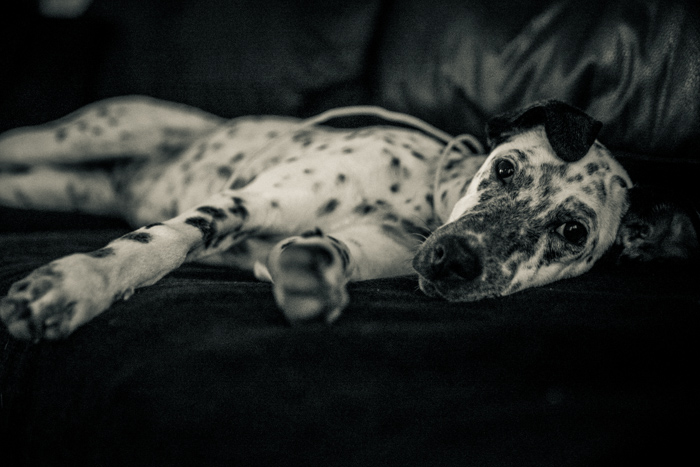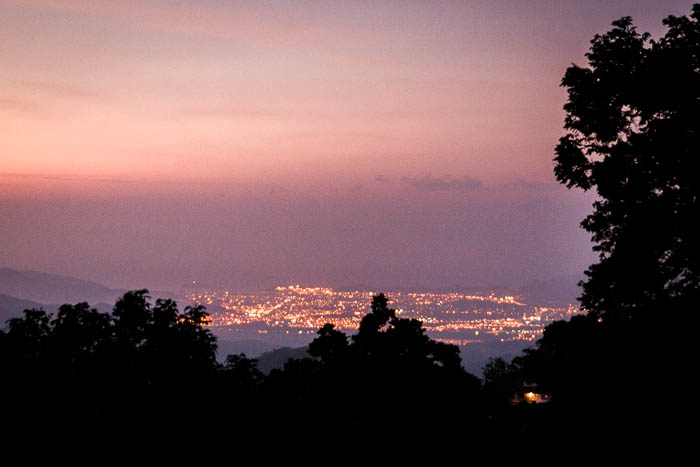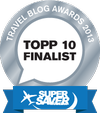Bocas del Toro2014-12-31 16:43:59
Syskonen tog dykcert i Bocas, väl värt! Förutom det var vi iväg till olika rev för snorkling och vi såg delfiner på vägen.
English version
Christine and Oscar took the divingcertificate in Bocas, well worth! Besides that, we were off to different reefs for snorkeling and we saw dolphins on the way.
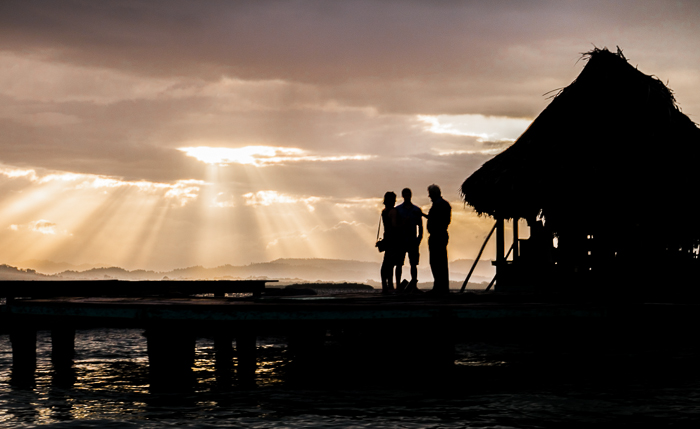
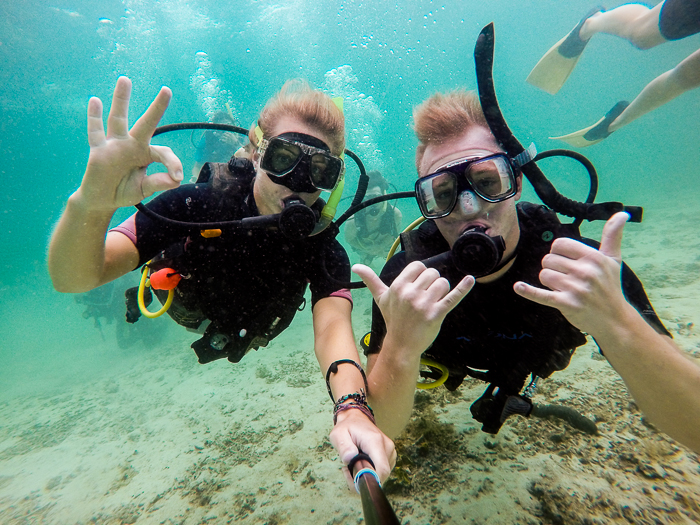

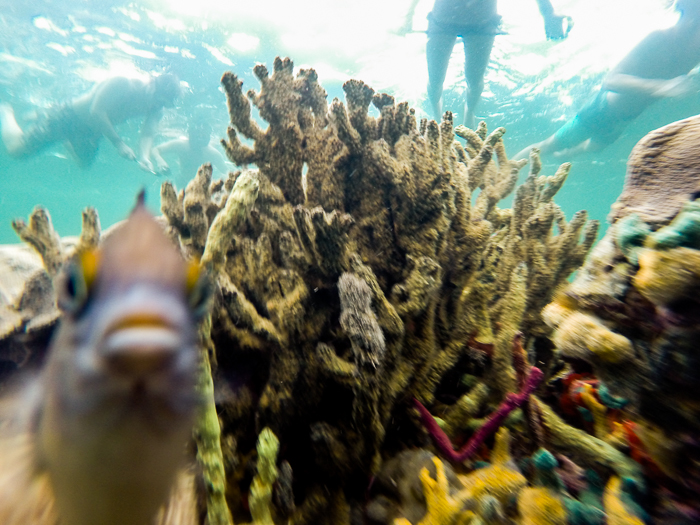
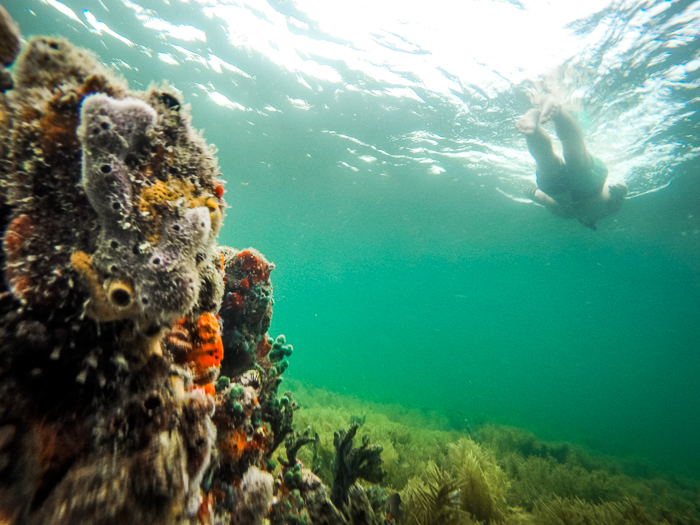



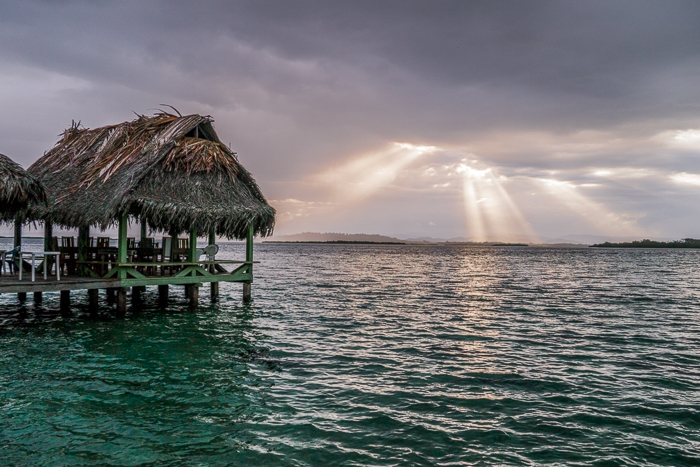


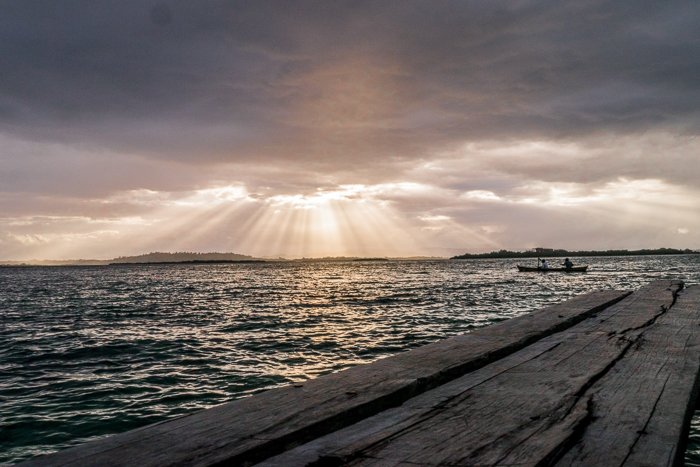
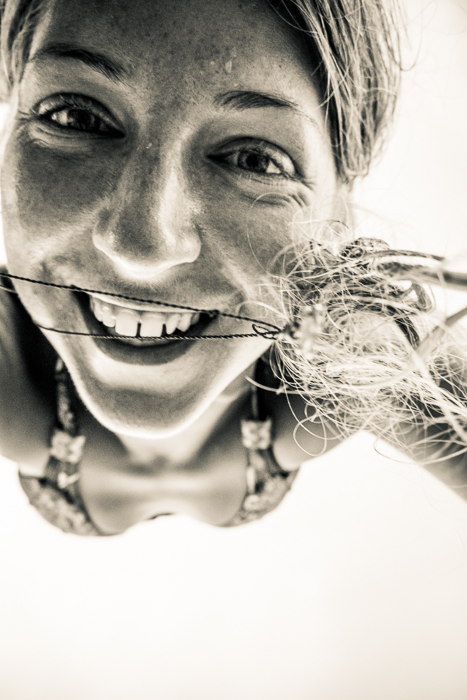




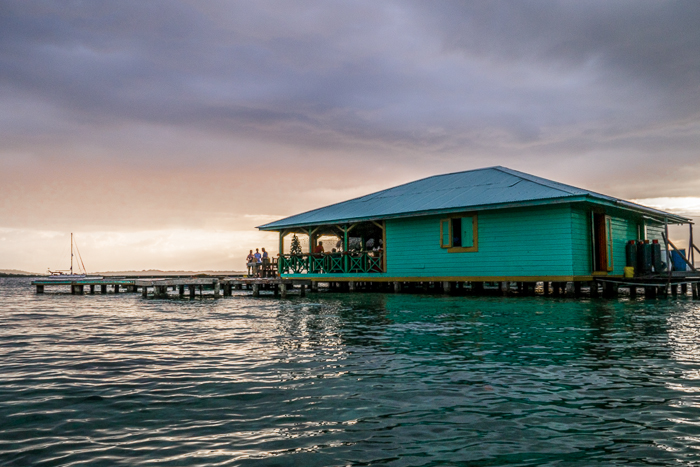

Christmas day2014-12-30 06:47:00
Ägaren till vårt hostel anordnade en liten resa för oss backpackers. Vi gav honom $5 var så gick han iväg och köpte en massa leksaker. Vi slog in dem och åkte bort till jungeln för att besöka en fattig by och ge barnen julklappar. Vilken höjdpunkt, barnen blev så glada. De var väldigt blyga och förvånade, men man såg i deras tindrande ögon hur lyckliga de blev. Jag låter bilderna tala för sig.
English version
The owner of our hostel arranged a trip for us backpackers. We gave him $ 5 each and then he went to buy a lot of toys. We wrapped them and went into the jungle to visit a poor village and give the kids the christmas gifts. What a great idea, the kids were so excited. They were very shy and surprised, but you could see in their sparkling eyes how happy they were. I'll let the pictures speak for themselves.
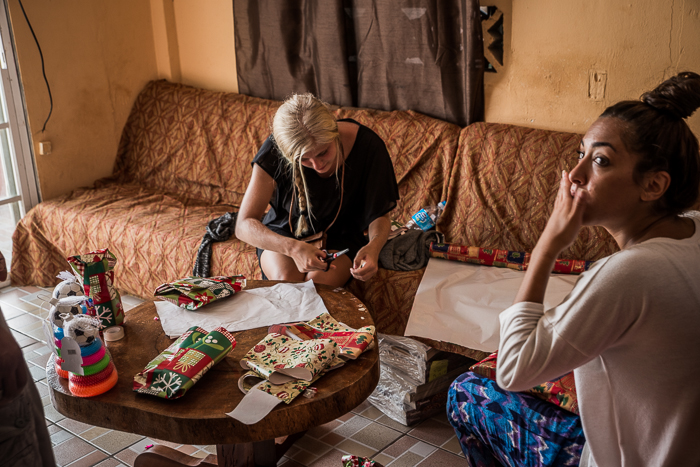
Wrapping christmas gifts

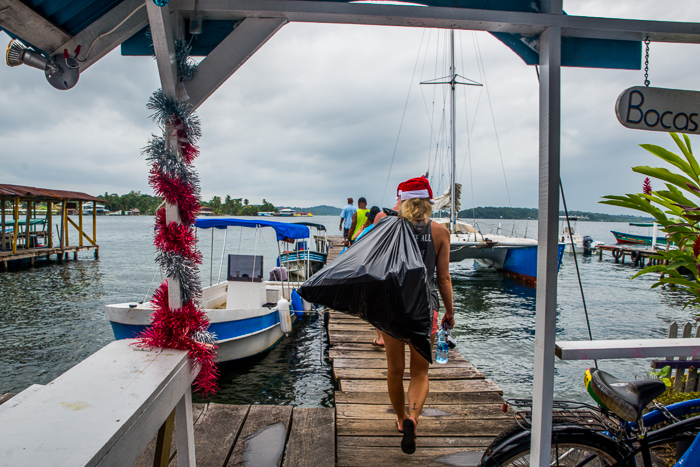
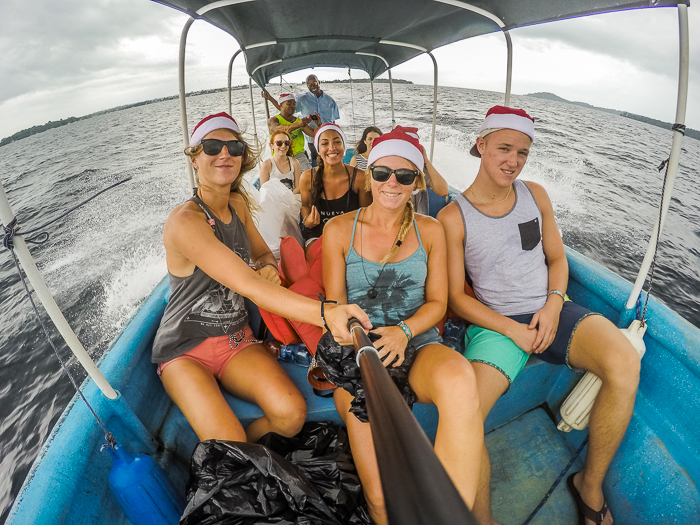
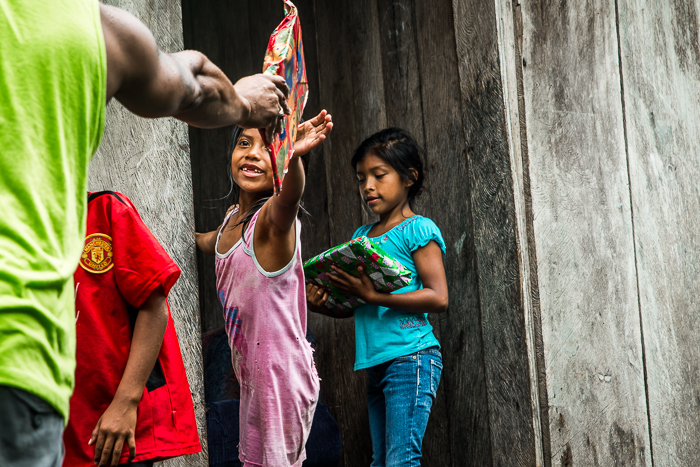
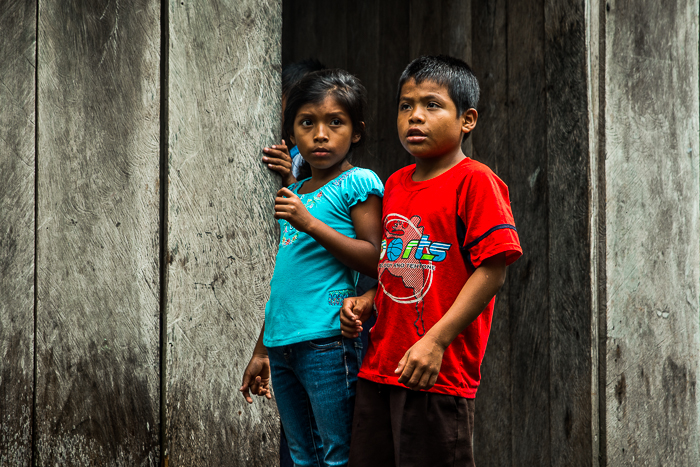
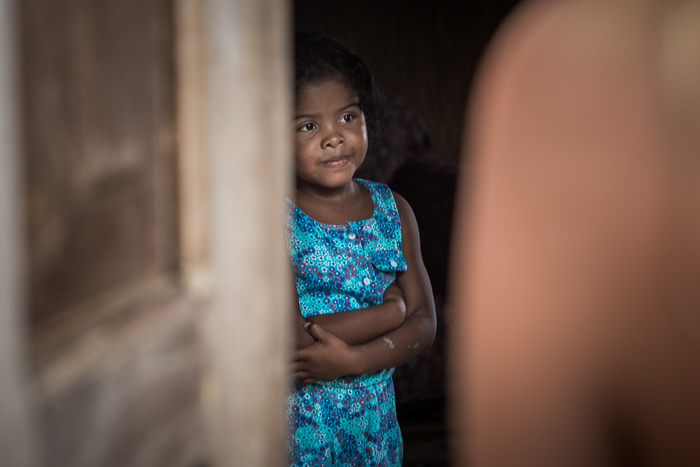
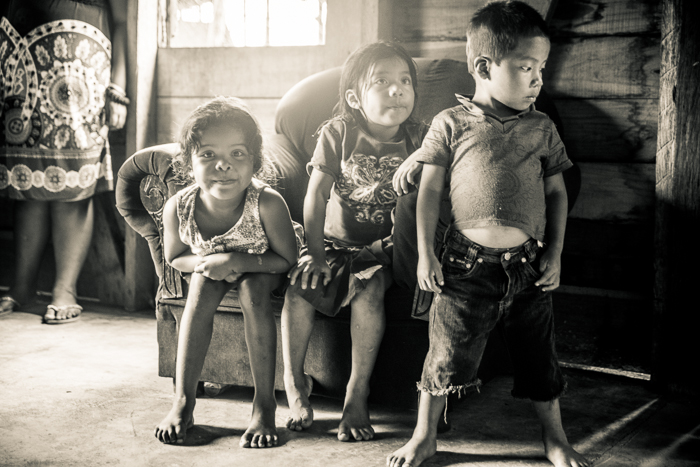


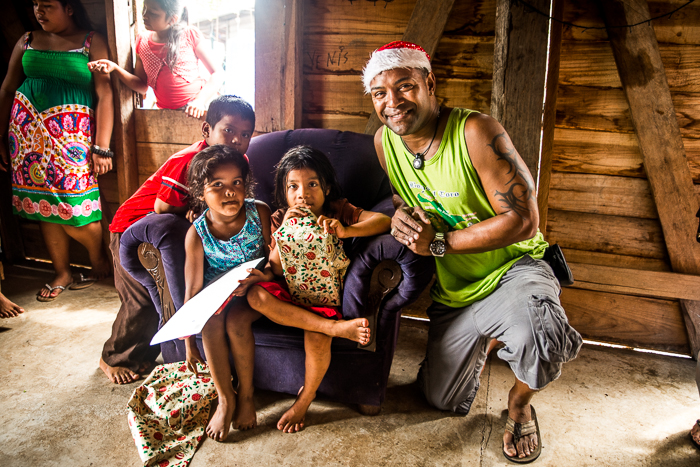
The very nice guy from our hostel who made this great trip happen



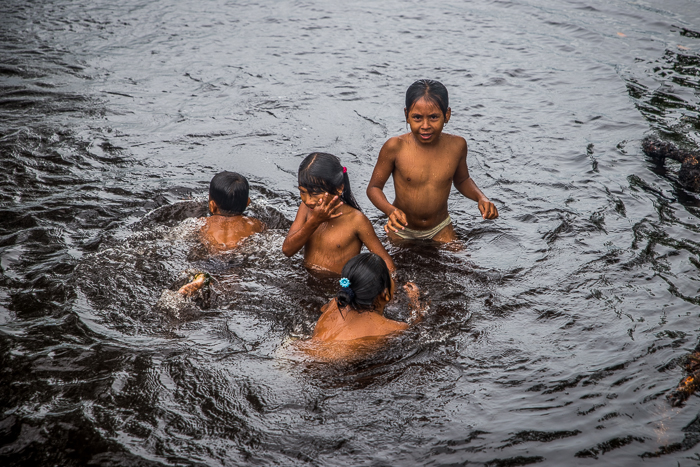
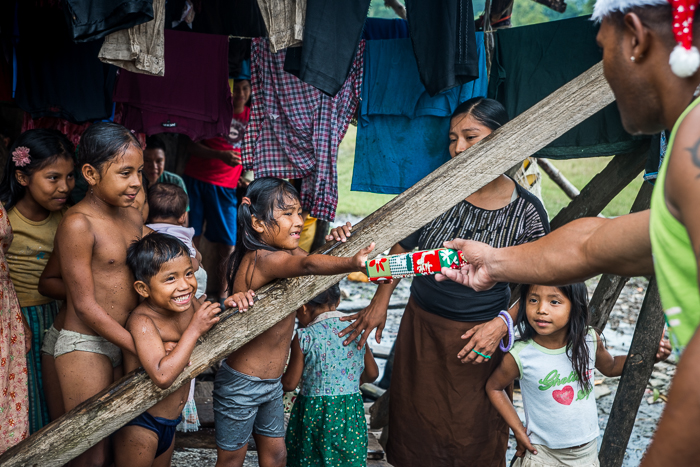



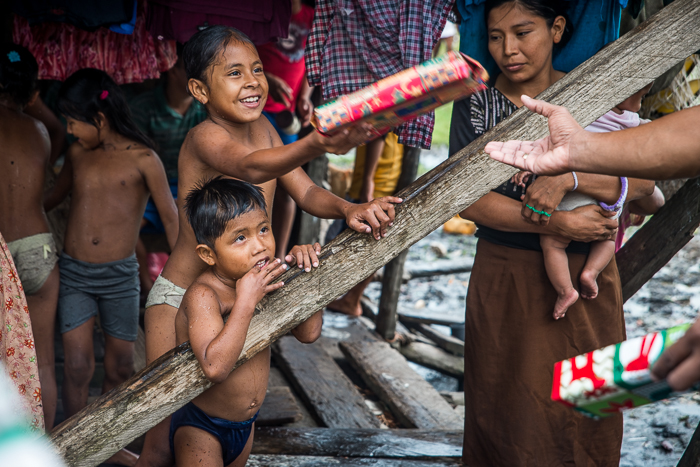
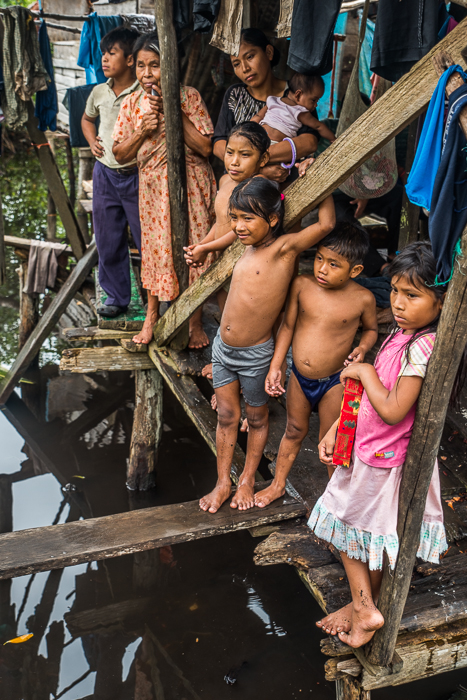
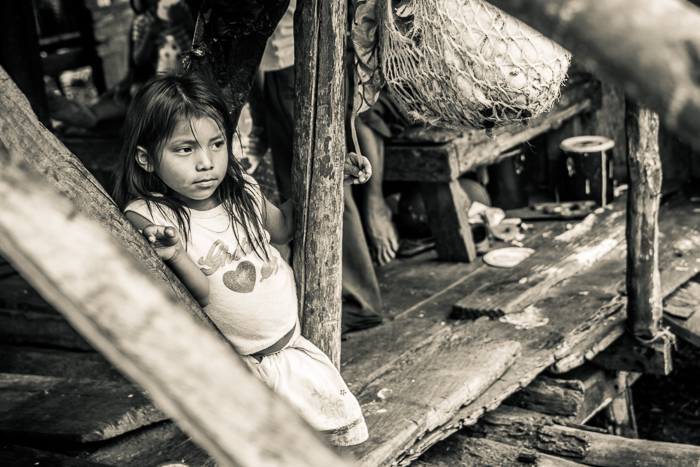

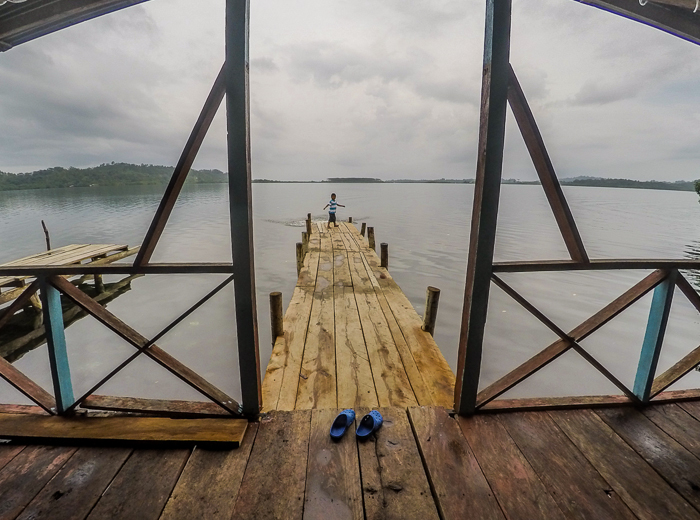

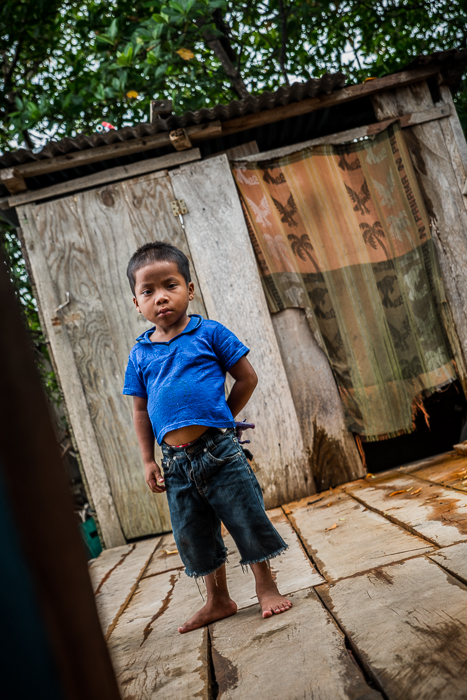

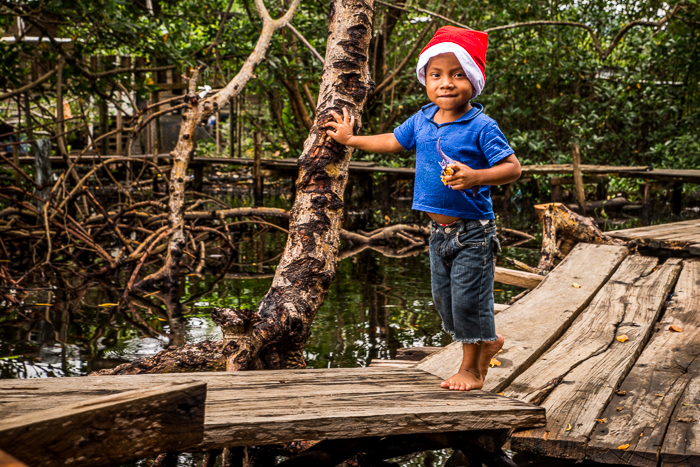
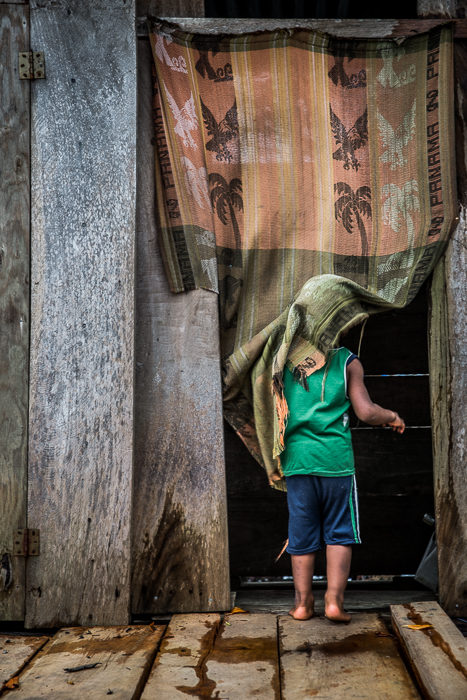
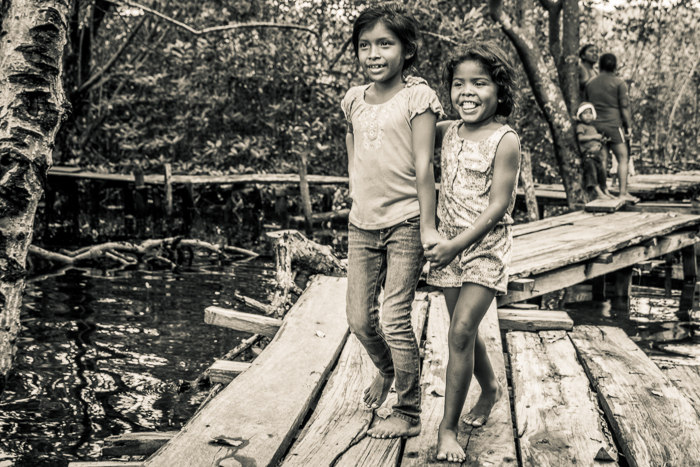
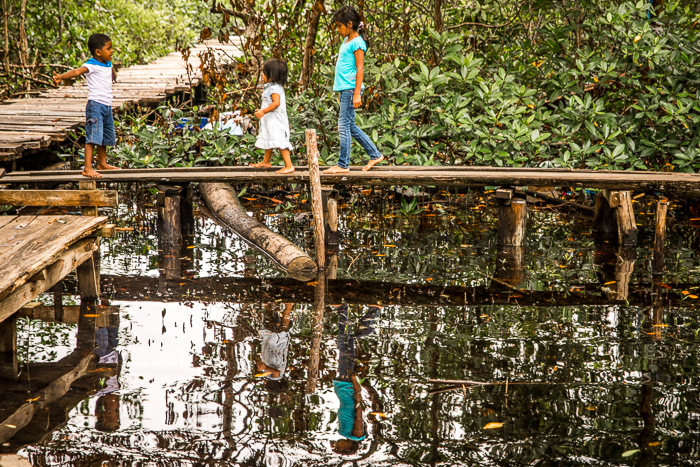
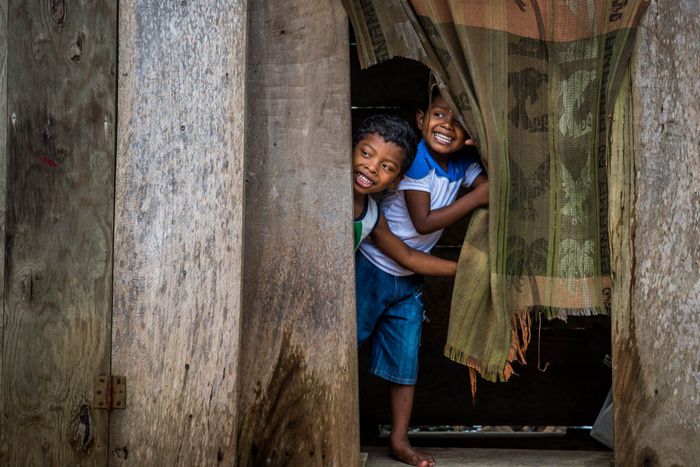
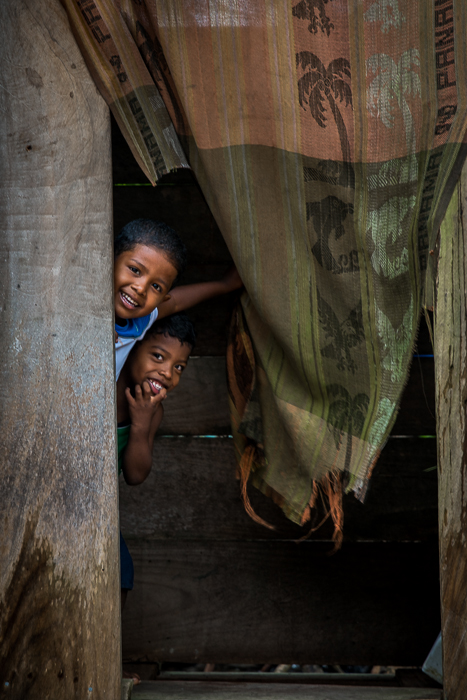
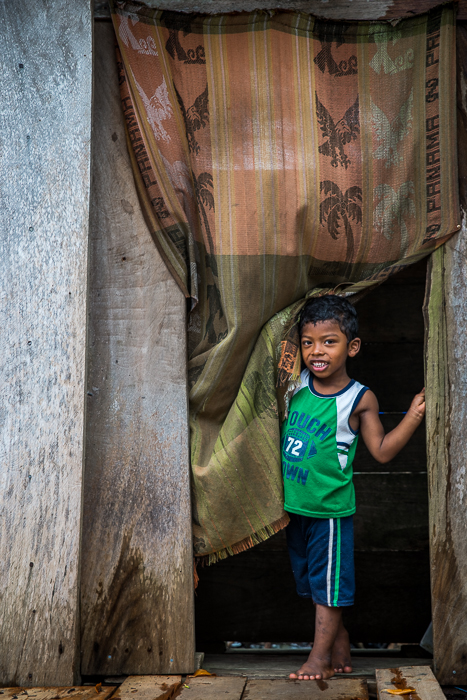
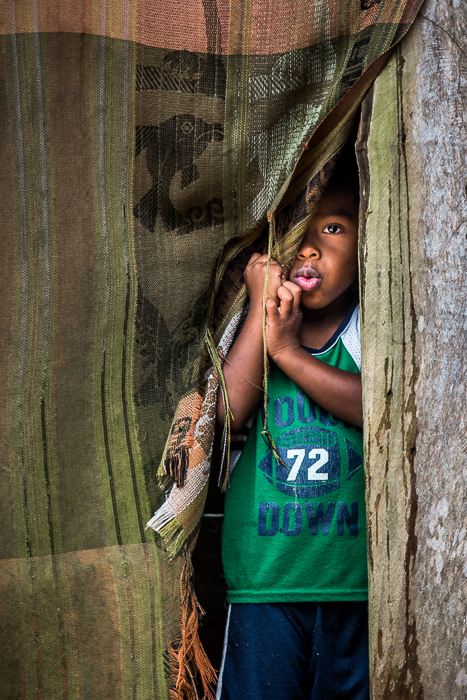


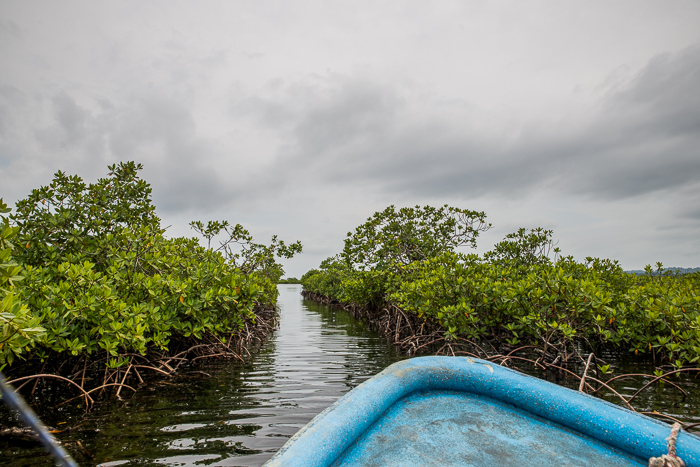
Through the mangroves.
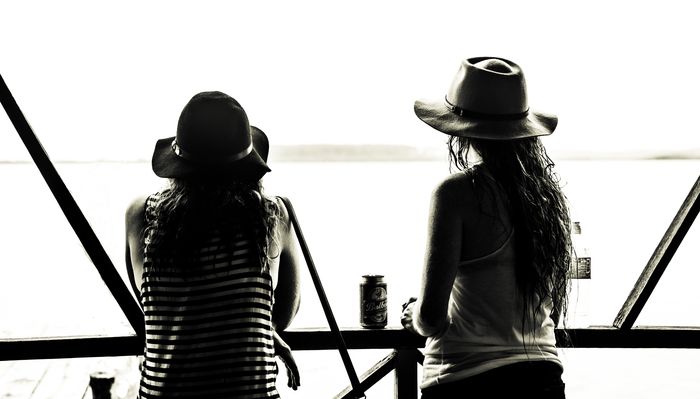
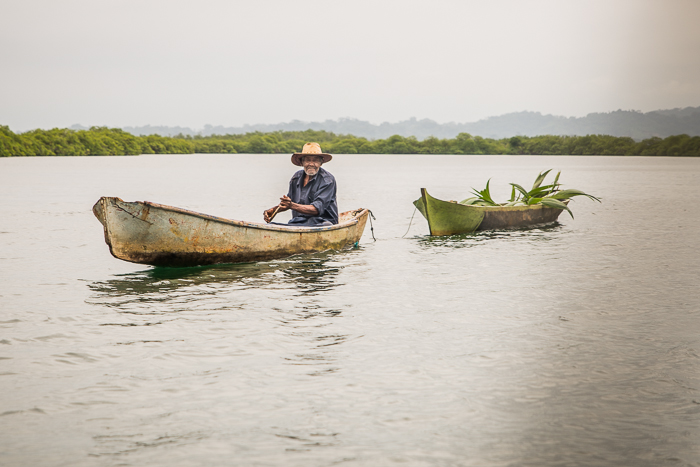
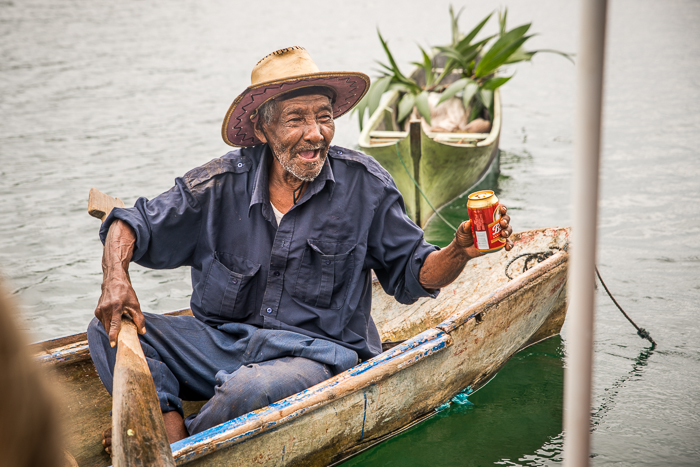
This man was so happy when we gave him a beer

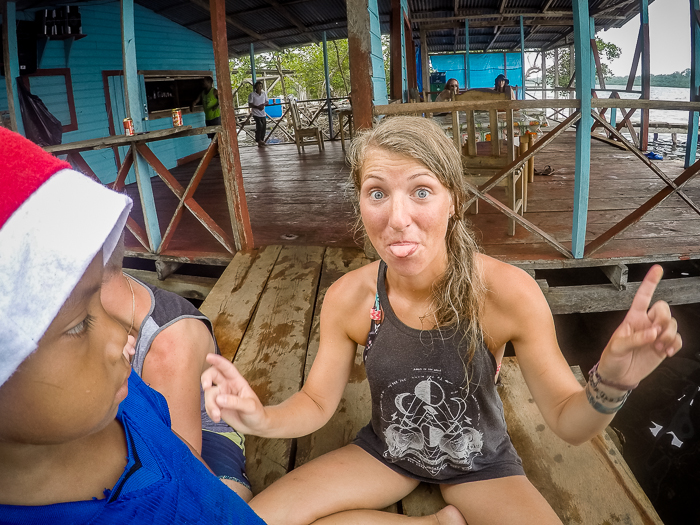

Feliz Navidad!2014-12-30 05:09:00
God jul på er alla! Bättre sent än aldrig, jag ligger ju ganska mycket efter med bloggen men den tar upp så mycket tid. Trots att det är semester så är tid inget vi har något överflöd av. Det är full rulle hela tiden, man är konstant trött och det att planera resor och vad vi ska göra på dagarna är vårat "jobb". Haha det låter kanske sjukt men Jossan, du känner ju till vad vi snackar om?!
Brorsan tog med lussebullar (!!!), marabou choklad, pepparkakor och algrens bilar hemifrån så vi kunde festa till det med lite gamla svenska traditioner. Förutom påsen med lösgodis, som den lilla skiten glömde hemma! Han tog också med sig några påsar med saffran, så medans han och syrran hade fullt upp med att utföra sin dykkurs, styrde jag ihop en saffranskladdkaka. Muuuums!
English version
Merry Christmas to you all! Better late than never, the blog is a bit behind, it takes up so much time. Although we are on holiday, spare time is not existing. We are constantly tired and planning trips and figure out what to do every day is our "job". Haha it may sound weird, but Jossan, you know what we're talking about?!
My brother brought saffron buns (!!!), swedish chocolate and lollis and gingerbread so that we could celebrate with some Swedish traditions. He also brought a few bags of saffron, so while he and Christine were out performing their diving course, I made a saffron cake. Nom!
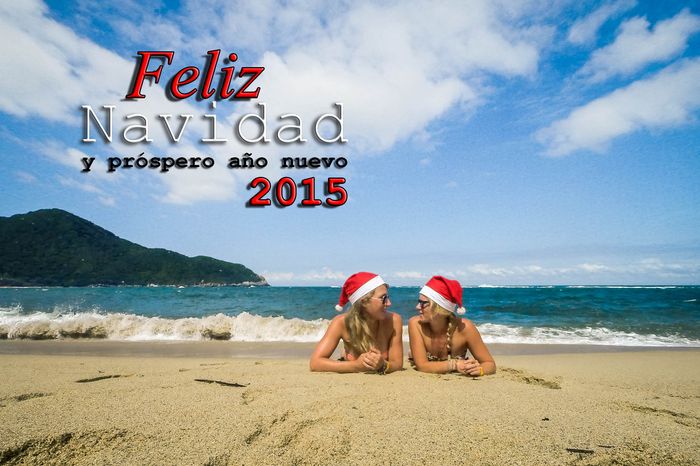

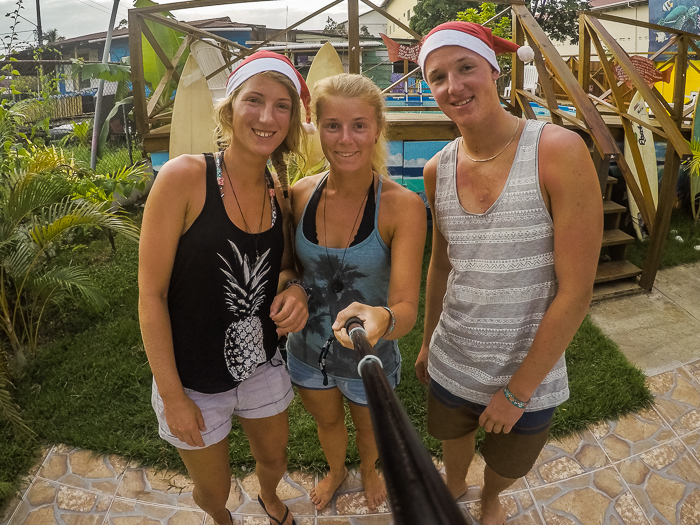



Saffron cake made in the microwave, it actually worked!

We went on a fireshow for Christmas eve

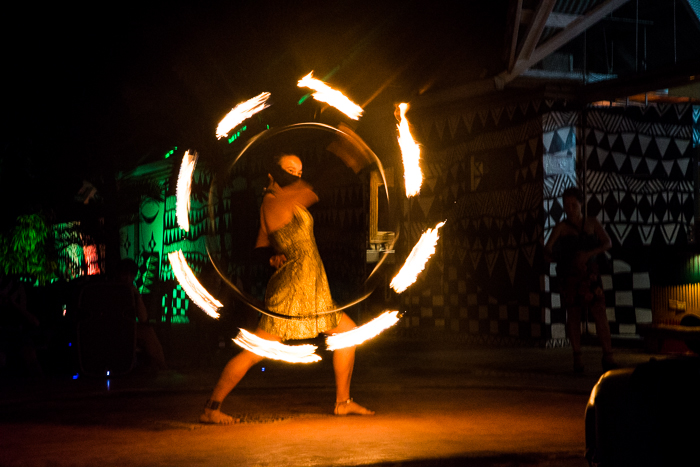
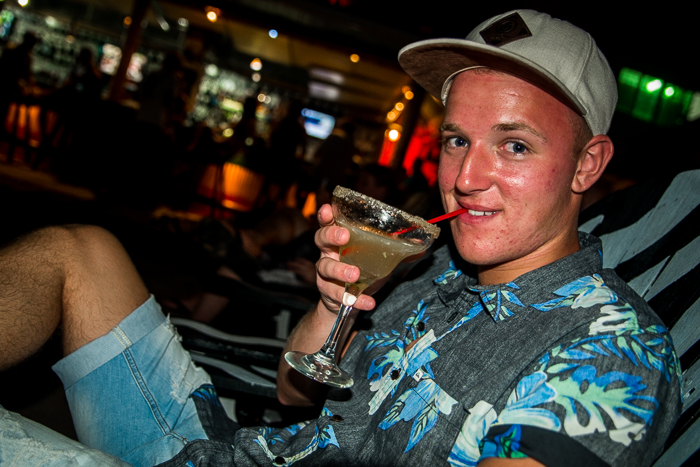




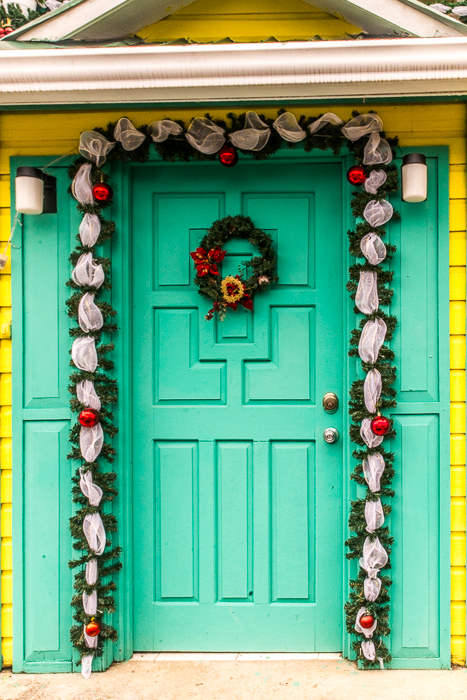
Traveling in Colombia2014-12-29 04:37:00
19 days spent in Colombia, a total of 405 SEK a day with all the activities listed belo with food and drinks. We are still on the budget, even though it gets more expensive the more north we go. We had to stay at some hotels a couple of times, instead of hostels, because we arrived at night and were recommended to check in at closest place.
Colombia, the best country so far! Higlights: Medellin and Taganga. Skip: Santa Marta, just go straight to Taganga instead. Don't miss Cocora Valley in Salento (as we did), it's supposed to be beatiful! If you know your route in advance, check the flights. They are as much as the buses but takes less than an hour.
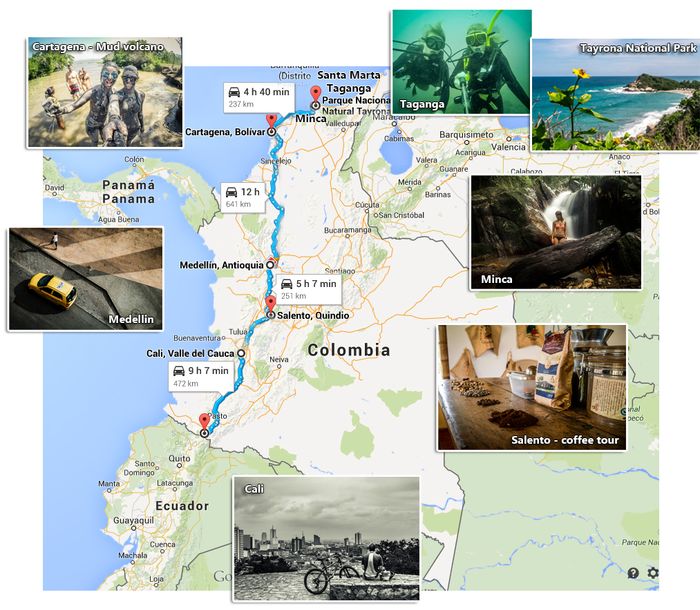
1 000 COP is $0,42 or 3,33 SEK today.
- Hotel in Ipiales: 15 000 COP/person for a private room
- Supertaxi from Ipiales to Cali: 35 000 COP
- Hotel in Cali: 23 500 COP/person in a private room
- Bus from Cali to Armenia: 20 000 COP
- Bus from Armenia to Salento: 1 900 COP (x2)
- Hostel in Salento, La Casona, 5 bed dorm: 17 000 COP
- Coffee tour in Salento: 8 000 COP + hitch hiking back to town for 2000 COP
- Bus from Armenia to Medellin: 35 000 COP
- Hostel in Medellin, Casa de Kiwi: 24 000 COP 4 bed dorm
- Traintickets one way in Medellin: 1 900 COP
- Bus from Medellin to Cartagena: 105 000 COP
- Hostel in Cartagena, Casa Viena: 15 000 COP (shared bed in a 4 bed dorm)
- Mud vulcano tour: 45 000 COP
- Bus from Cartagena to Santa Marta: 42 000 COP (there is cheeper options though, but we were lazy)
- Hostel in Santa Marta, Casa Familiar: 16 000 COP
- Bus from Santa Marta to Taganga: 1 500 COP
- Hostel in Taganga, Casa de Felipe: 19 000 for 8 bed dorm. (great hostel with awesome steak)
- 2 Fun dives, Oceano Scuba: 130 000 COP/Discovering Scuba (without certificate) 190 000 COP
- Stand up paddle board: 25 000 COP/hour
- Partybus: 35 000 COP
- Bus from Santa Marta to Tayrona: 6000 COP
- Entrance for Tayrona National Park: 38 000 COP
- Sleeping in a hammock at Don Pedro: 12 000 COP
- Horsebackriding 2 hours: 30 000 COP
- Bus from the stable to the entrance of the park: 3 000 COP
- Bus from Santa Marta to Minca: 7 000 COP
- Hostel in Minca, Casa Loma: 22 000 COP
- Entrance for a waterfall in Minca: 3 000 COP
- Bus from Santa Marta to Cartagena 20 000 COP + taxi from busterminal 15 000 COP
- Partyboat in Cartagena: 80 000 COP
Red Frog Beach - Bocas del Toro2014-12-28 16:11:04
Efter Panama City tog vi bussen till Bocas del Toro. Nu i juletider är det lite kaotiskt, allt är fullbokat. Vi stod i en timmes kö till bussen och till vår stora förvåning fanns det biljetter samma kväll. Vi var tvungna att förboka hostel i förväg för första gången på vår resa, eftersom allt var fullt. Det blev ett dyrt hostel, $18. Aouch. Bussen var rena rama Antarktis. Tydligen är det lyxigt att ha aircondition på högsta ös här i Panama, och det hade vi redan fått erfara i butikerna i Panama City. Men bussen var extrem. Vi som vet att bussar antingen är för kalla eller för varma har alltid med oss långbrallor och tjocktröja, men det räckte inte den här gången. Vi åkte i en frys i 11 timmar. Alla andra på bussen hade sovsäckar, dunjackor, mössor och sockar.
Framme i Bocas del Toro hoppade syskonen på en Open Water dyk kurs, men innan det hann vi med att åka till Red Frog beach. Det var skönt att värma upp kroppen igen i den stekande solen.
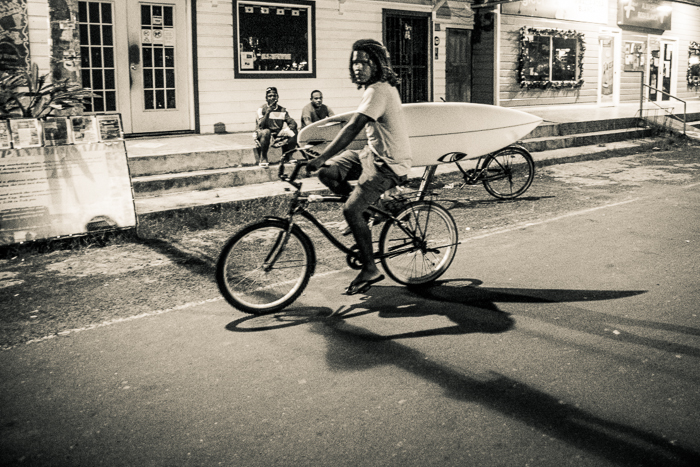
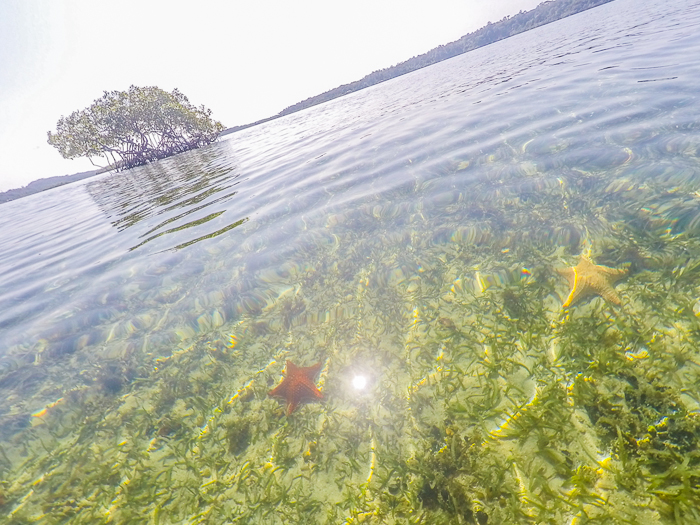
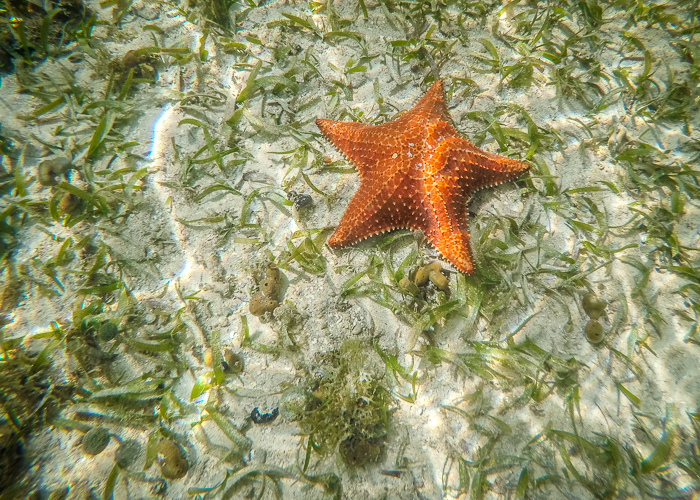
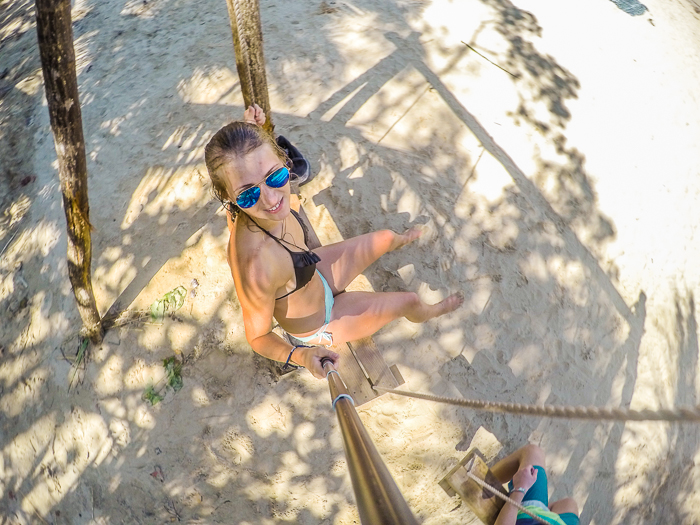





Vinn en resa till din drömdestination!2014-12-28 02:20:00
Jag har det helt underbart här i Latinamerika. Men ändå finns det en längtan i mig efter vinter, hur knäppt det än låter. Man blir ju lite avundsjuk av att titta på bilder som ni lägger upp där hemma - en riktig svensk jul. Med skidåkning. Jag gled in på Momondo.se och där har dem en sjukt bra sida för att hitta resor. Man klickar in ett önskemål som stränder, shopping eller skidåkning för när som helst och var som helst. Min drömdestination för 2015 är att få åka till Japan och dyka i deras omtalade puder. Varför inte Niseko? 4 500 kr i April. 20 meter puder och torr, frisk vinterluft. Det sägs att japaner älskar skidåkning men de tror att skogarna är hemsökta. Därför undviker de skogsnedfarter. Hallå, hur bra?!
Vill du vinna en resa till ditt drömresemål 2015?
1. Gå in på momondos hemsida och hitta din drömdestination genom Trip finder.
2. Skriv en kommentar på det här inlägget med en av destinationerna som Trip Finder föreslagit.
3. Skriv in ditt namn och din mailadress på kommentaren (uppgifterna blir inte offentliga)
Du har alltså chans att vinna tur och retur biljetter till den destination du anger i kommentaren, av ett värde upp till 1 500 Euro.Vinner du kan du välja att åka själv eller ta med en vän och dela på prissumman. Tävlingen är öppen för svenska, danska, norska och finska medborgare. Momondos jury kommer slumpvis välja vinnaren.
Deadline för din kommentar är den 31 januari 2015 klockan 14.00 svensk tid.
LYCKA TILL!!!

Colombia the movie2014-12-28 01:30:51
Enjoy!
Panama City2014-12-28 01:12:00
Såklart skulle vi ha lite mer otur nu när vi redan hade gått ned i det träsket. Jag och syrran drog till flygplatsen för att möta upp brorsan som ska hänga med oss i tre veckor. Han dröjde. Läänge. När han väl dök upp kom han utan packning. Den var kvar i Miami. Vi fick tillbringa ett extra dygn i Panama City för att vänta på den jäkla väskan. Så det första vi gjorde med brorsan var att spendera en massa timmar i ett köpcentrum.
Förutom shopping gick vi runt och tittade i Panama Citys gamla del, Casco Viejo, och så drog vi till Panama kanalen och tittade på stora fartyg som slussade. Maffigt, absolut, men jag föredrar Göta Kanal. I och med att amerikanarna kom och byggde Panama kanalen så har hela Panama blivit extremt amerikaniserat. Många pratar engelska, folk är lata och ganska storvuxna, och det är dyrt. Väldigt stor skillnad från Sydamerika. Dessutom har det börjat ploppa upp en massa skandinaver, och framförallt svenskar här, de var obefintliga i Sydamerika. Centralamerika är kanske en mer poulär destination bland oss skandinaver.

English version
Besides the shopping, we walked around in the old town of Panama City, the Casco Viejo. We also wenr to the Panama Canal and watched the large vessels going thorough the locks. Cool, absolutely, but I prefer our canal in Sweden, Göta Kanal. As the Americans came and built the Panama Canal, the whole Panama has become extremely americanized. Many speak English, people are lazy and very big, and it's expensive. A huge difference from South America. It has begun popping up a lot of Scandinavians, they were non-existent in South America. Central America is perhaps a more poular destination among Scandinavians.

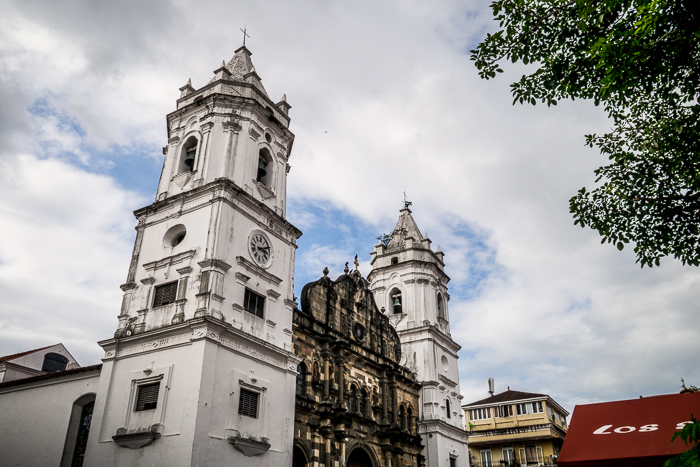
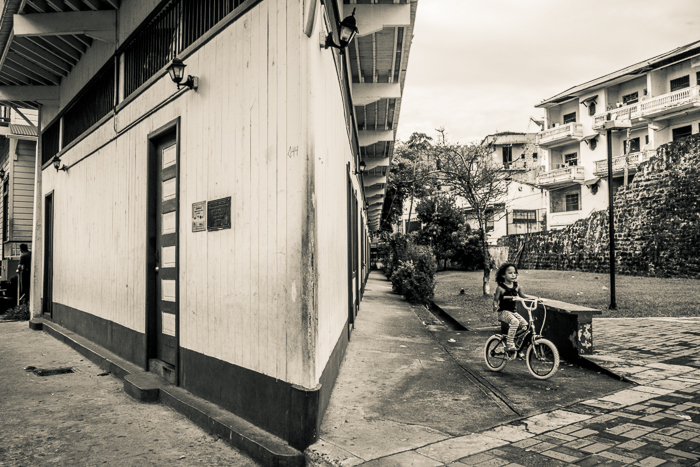
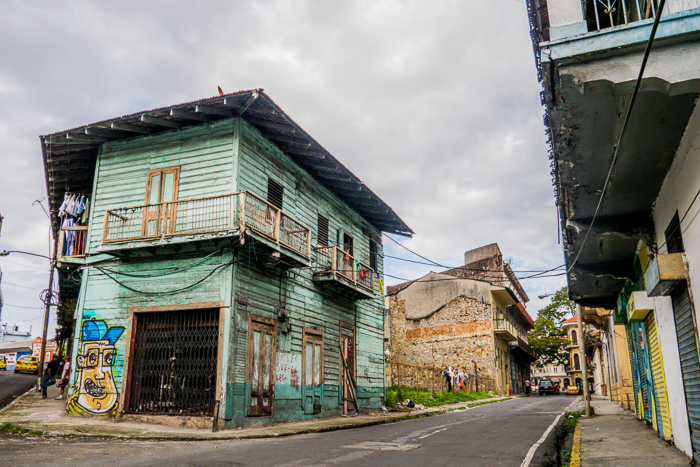
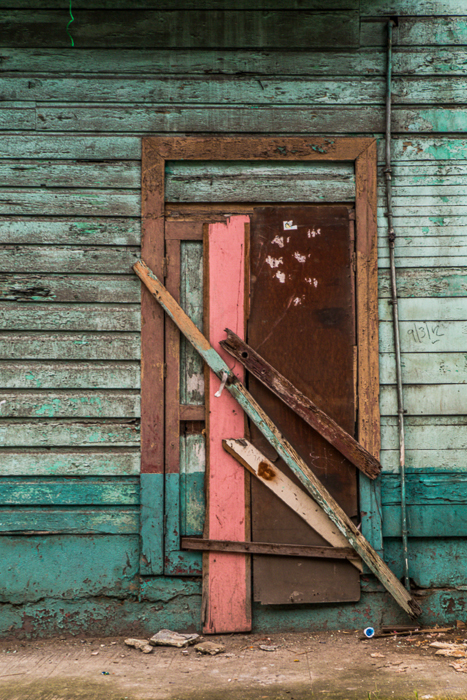

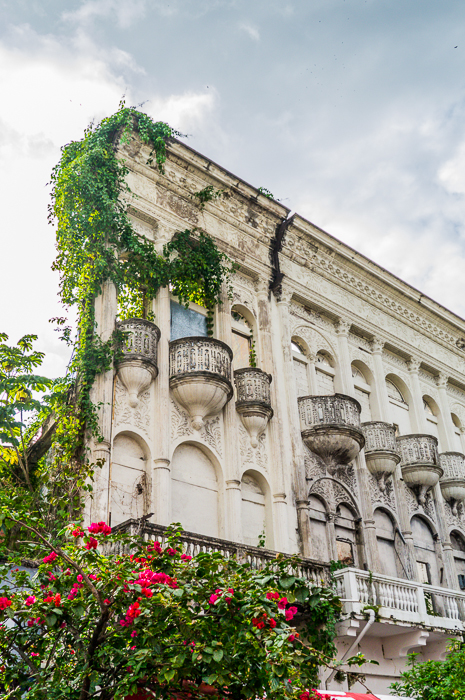
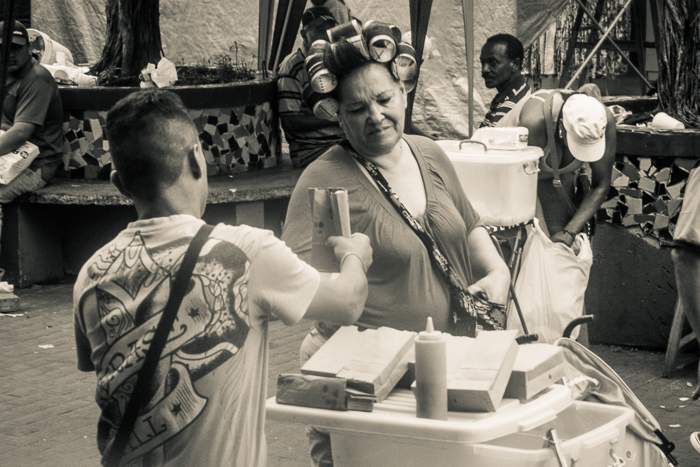
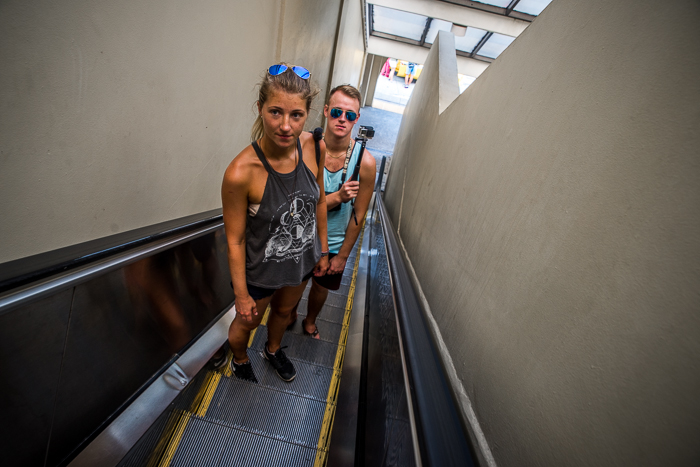



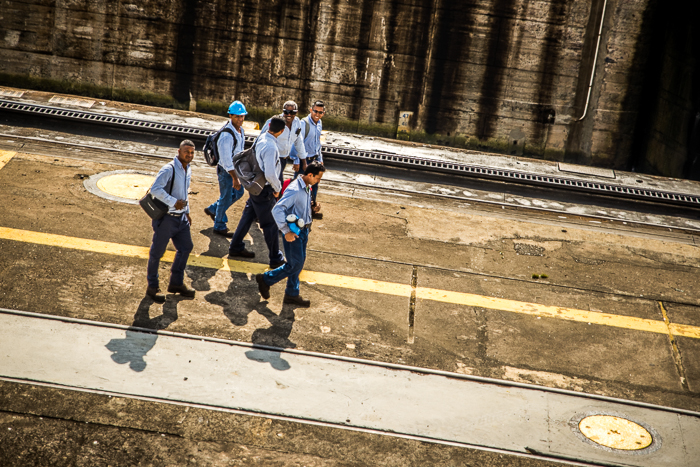
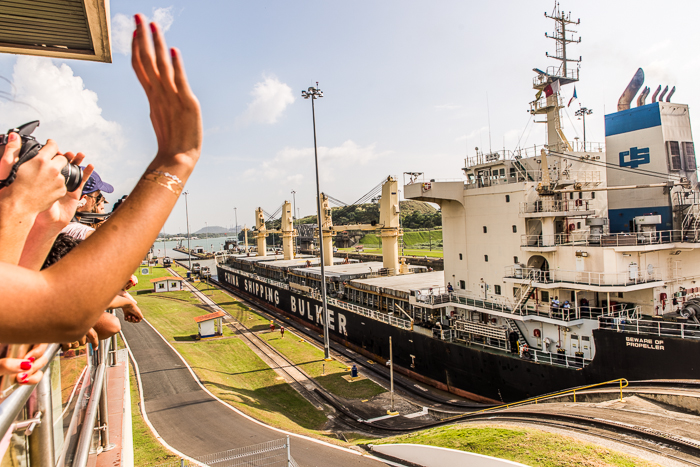
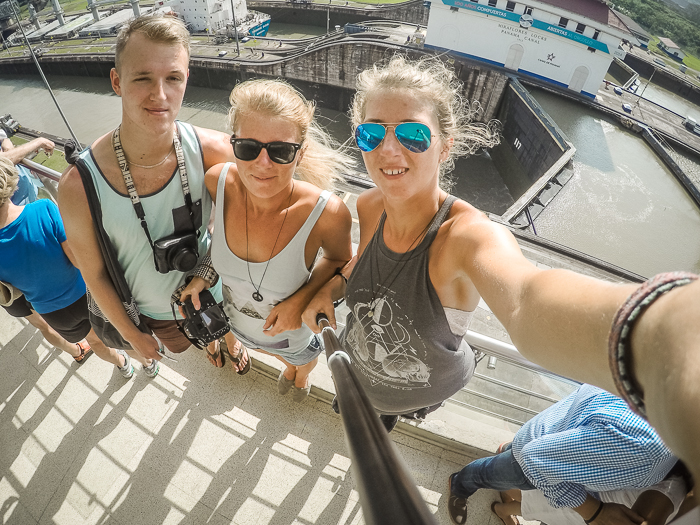
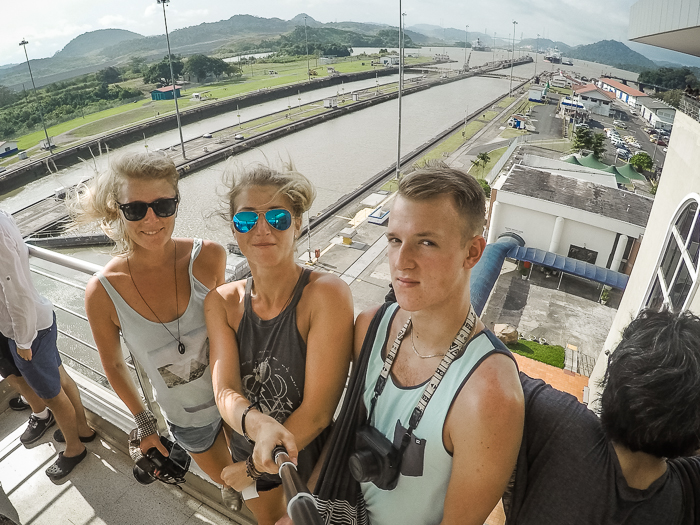
Immigration troubles2014-12-27 01:55:00
Vi blev väckta av familjen klockan fem på morgonen. De visade oss vägen tillbaka till speedboaten och där väntade vi till solen gått upp för att sedan ta oss vidare mot El Povenir. Resan tog oss tre timmar, och när vi väl var framme på immigrationsön var det första gången som det kändes som att allt skulle lösa sig. Den känslan höll sig dock inte länge.
Vi gick in till immigrationskontoret och möttes av en inte så glad passkontroll. Han fick vårt dokument där det stod att vi var passagerare på Ave Maria, men han kunde inte förstå hur vi kunde tagit oss dit på egen hand och han kunde ännu mindre förstå varför Paul inte var med oss. Detta skulle innebära problem. Enligt pappret var Paul ansvarig för oss, men nu var det ingen som hade det ansvaret. Vår hjälte, speedboat-kaptenen hoppade in och sa att han var vår nya kapten, och lyckades få passkontrollanten att skriva ett nytt dokument som han kunde skriva under.
English version
The family woke us up at 5 am. They showed us the way back to the speedboat, where we waited for the sun to rise. Then we went on towards El Povenir. The trip took us three hours, and once we arrived at the imigration island, it was the first time we felt like everything would be fine. That feeling was, however, not lasting for very long.
We went to the imigration office and was greeted by, a not very happy, passport officer. He took our document which said that we were passengers on Ave Maria, but he could not understand how we managed to arrive on our own and he could even less understand why Paul was not with us. This meant big trouble. According to the paper, Paul was responsible for us, but now there was no one who had that responsibility. Our hero though, the speedboat captain, said that he was our new captain, and managed to get the passport officer to write a new document that he could sign.
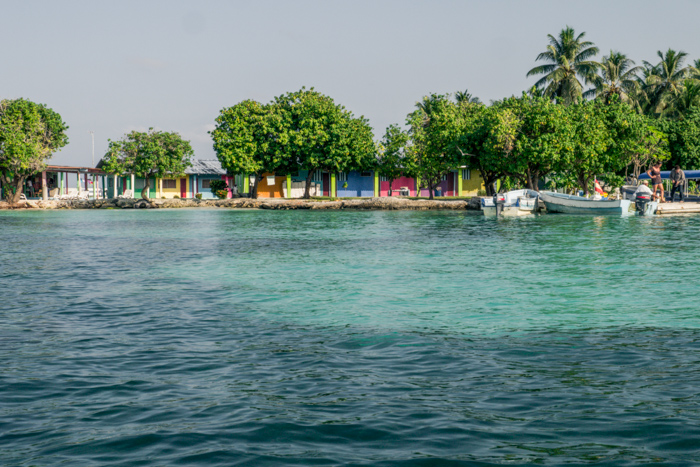
El Povenir - the immigration island
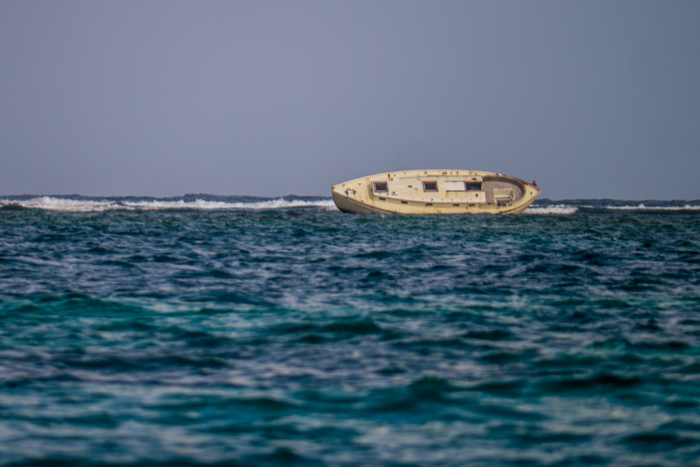
This is how we could have ended up with Pauls non exicting navigation skills
Vi hade dock ett stort problem kvar. För att få komma in i Panama från en segelbåt så måste man kunna bevisa att man ska flyga ut ur landet inom 72 timmar. Det är väldigt få backpackers som har lust att resa ut ur Panama så fort, därför hade turföretagen fejkat flygbiljetter till oss alla. Men för tre av oss hade företaget skrivit ut biljetter med fel namn på, och detta var såklart inte bra. Vi blev skyldiga passkontoret $300. Vi var fortfarande skyldiga speedboat kaptenen nästan $100 - pengar som vi inte hade. Hur skulle vi kunna betala alla dessa pengar? Omöjligt.
English version
However, there was still a big problem remaining. To enter Panama from a sailboat you must have a proof of that you will exit the country within 72 hours. There are very few backpackers who have the desire to exit Panama that soon, so the company who organised the tour faked flight tickets for all of us. Three of us had not got the tickets though, and this was obviously not good. We were obliged the passport office $300. We still needed to pay the speedboat captain almost $100 - money that we did not have. How would we be able to pay all of this? Impossible.
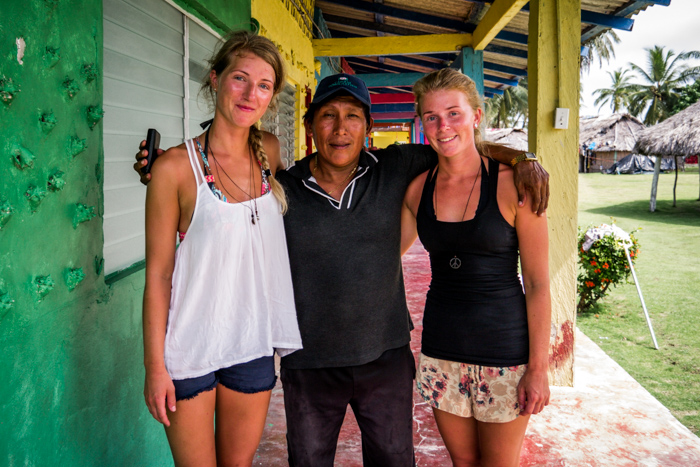
Our speedboat driver. He is a hero, he helped us with a lot of things. He is a very good man. Please, if you need transportaion in San Blas, contact him here.
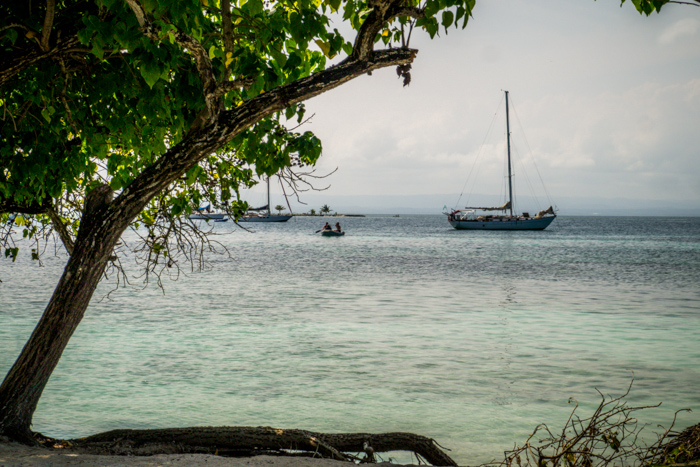
The boys swam out to Dolphin Solo to ask for help. Here they are coming back in the dinghy with the captain.
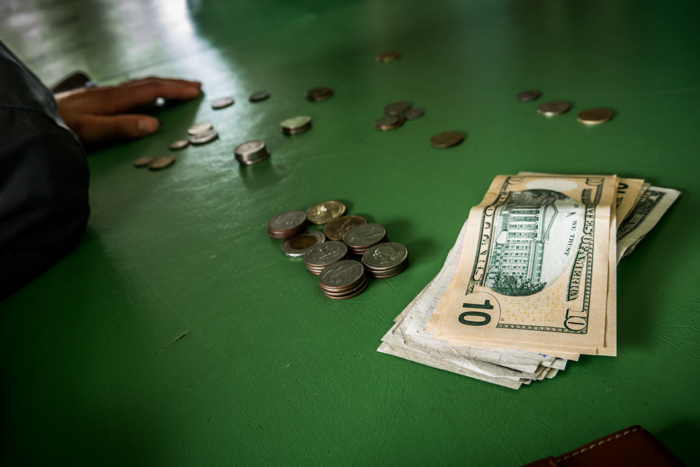
We counted every single penny in all different currencies.
Hopplösa och desperata efter pengar förde vi flera samtal med Laurel, på denna ö fanns det i alla fall mottagning. Hon sa att det fanns en båt vid namn Dolphin Solo i närheten som tillhörde samma företag som kunde hjälpa oss. Båten låg ute på svaj, så Sam och Danny simmade ut till den och bad om hjälp. Under tiden satt vi och räknade småpengar och försökte klura ut hur sjutton vi skulle göra upp med speedboatkaptenen som hängt med oss det sista dygnet, hjälpt oss på alla möjliga sätt och som nu satt och väntade på sina pengar. Till vår stora glädje kom kaptenen på Dolphin Solo roendes in till land med grabbarna.
Så fort Dolphin Solo kaptenen satte sin fot på ön ändrades hela situationen. Han undrade hur Paul kunde lämna oss i sticket utan pengar. Han undrade också varför han valde att genomföra överseglingen då väderleksrapporterna inte sett bra ut de senaste dagarna. Han skulle själv ha gjort samma översegling, men valde att inte genomföra den. Dolphin Solo var till och med den båt som jag och Christine egentligen skulle ha åkt med, om han inte hade kansellerat resan. Hade Paul kontaktat någon hade vi till och med kunnat bya båt då Dolphin Solo låg i en vik någon timme ifrån Carreto dagarna innan. Kaptenen betalade speedboat föraren och skrev ut nya flygbiljetter så helt plötsligt var vi skuldfria och instämplade i Panama. Han köpte oss öl och sa;
- It’s on Paul.
Sedan anordnade han en taxibåt som tog oss till en annan ö, Chichime. Där fick vi spendera natten på ett hostel med öppen bar och frukost, lunch och middag. Räkningen skulle skickas till Paul. Äntligen fick vi spendera ett halvt dygn (istället för tre) på en av San Blas öarna, äntligen fick vi festa till det och det bästa av allt – Paul betalade fast han inte visste om det. Ön var mysig, men fortfarande inte en av öarna vi hade blivit lovade. Vi skulle ju segla till obebodda öar, fiska hummer och bo i båten. Här var det en massa folk och hyddor, och snorklingen var inte så mycket att hänga i julgranen. Men vi var så fruktansvärt lättade, vi slapp bekymra oss om pengar som vi fortfarande inte hade. Vännerna var helt utslagna den eftermiddagen, trots att vi borde ha utnyttjat varenda liten timme vi hade på den enda San Blas ön, så var det ingen som orkade göra annat än att sova middag. Det behövdes heller inte många droppar alkohol för att alla skulle däcka den kvällen.
English version
Feeling hopeless and desperate for money, we managed to call Laurel, this island actually had cellphone reception. She said that there was a boat named Dolphin Solo nearby, that belonged to the same company, that could help us. The boat was laying for anchor in the bay, Sam and Danny swam out to them asking for help. Meanwhile, we sat and counted the last pennies we had and tried to figure out how the heck we would make up for the speed boat. The captain had been with us the last 24 hours, he helped us in every possible way and just sat there waiting for his money.
The captain of the Dolphin Solo came to the island with the boys. As soon as he put his foot on the island, the whole situation changed. He wondered how Paul could send us away without any money. He also wondered why he chose to do the crossing when the weather reports had not been looking good the recent days. He himself would have done the same crossing, but chose not to do it. Dolphin Solo was the boat that Christine and I originally booked, if he had not cancelled the trip. If Paul had contacted someone we would have been able to change boat though Dolphin Solo stayed in a bay about an hour away from Carreto the days before. The captain paid the speedboat driver and printed new flight tickets. All of a sudden we were debt free and got our stamps for Panama. He bought us beers and said;
- It's on Paul.
Then he arranged a water taxi that took us to another island, Chichime. There we spend the night in a hostel with open bar, breakfast, lunch and dinner. The bill would be sent to Paul. Finally we got to spend half a day (instead of three) on one of the San Blas Islands, finally we got to have a party and best of all - Paul paid though he did not know about it - yet. The island was cozy, but still not one of the islands we had been promised. We were supposed to sail to uninhabited islands, go fishing lobster and sleep in the boat. On this island it was a bunch of people and huts, and the snorkeling was not so much to cheer about. But we were so damn relieved, we did not have to worry about the money that we still didn't have. The friends were completely exausted that afternoon, even though we should have taken advantage of every single hour we had on that only San Blas island, everyone needed a powernap. It didn't require many sips of the drinks before everyone got smashed that night.
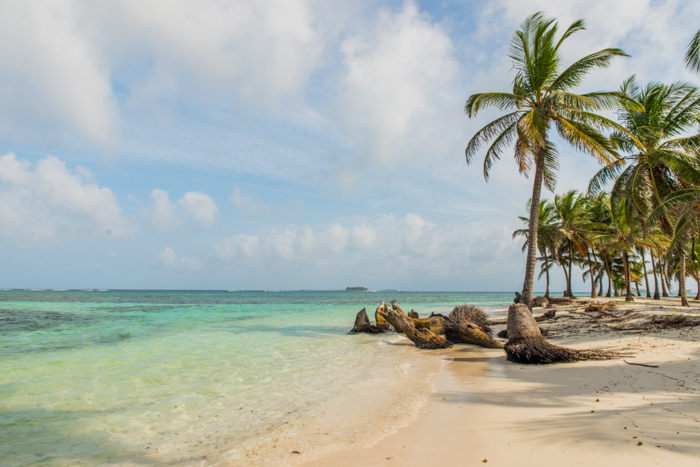
Chichime island
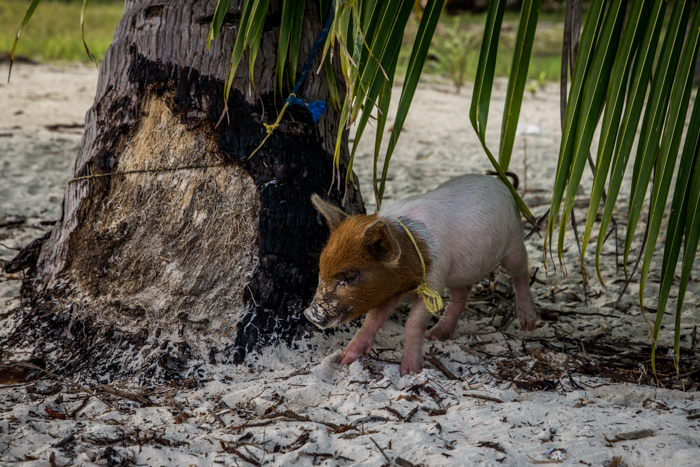
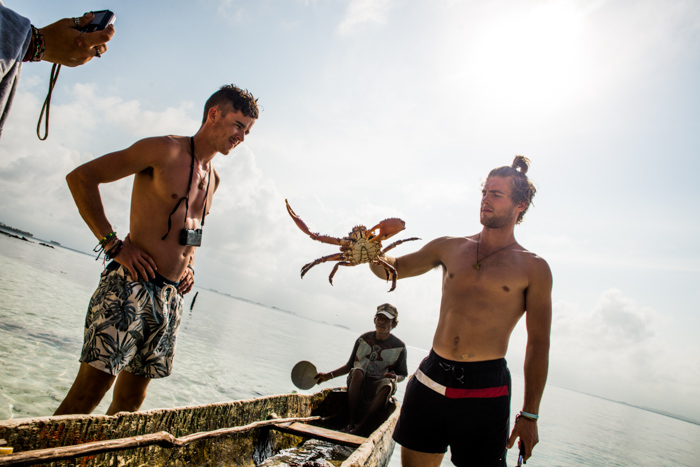
We could at least pretend that we had been fishing
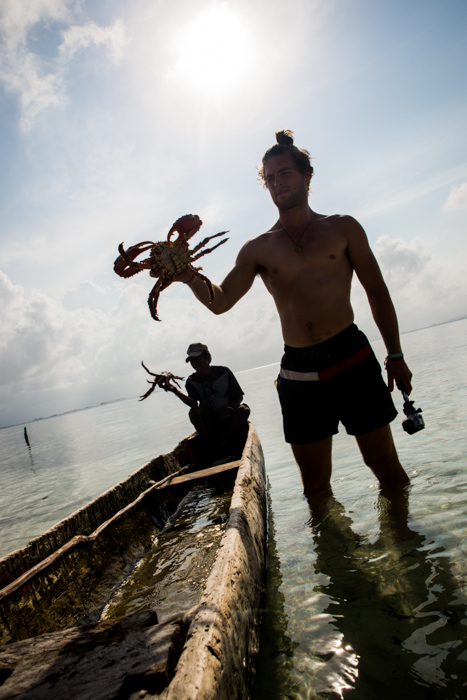
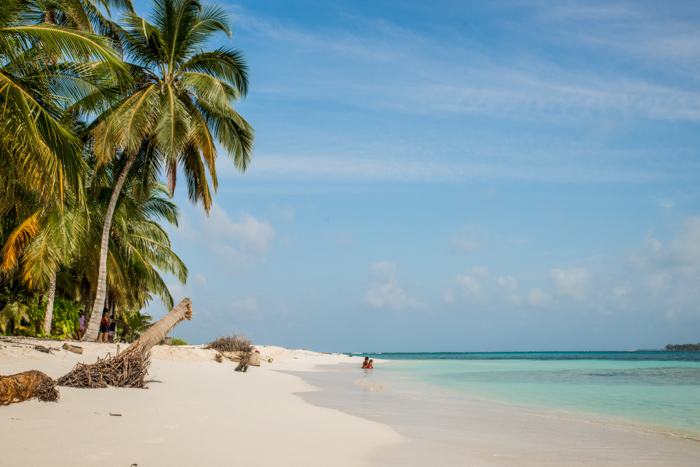
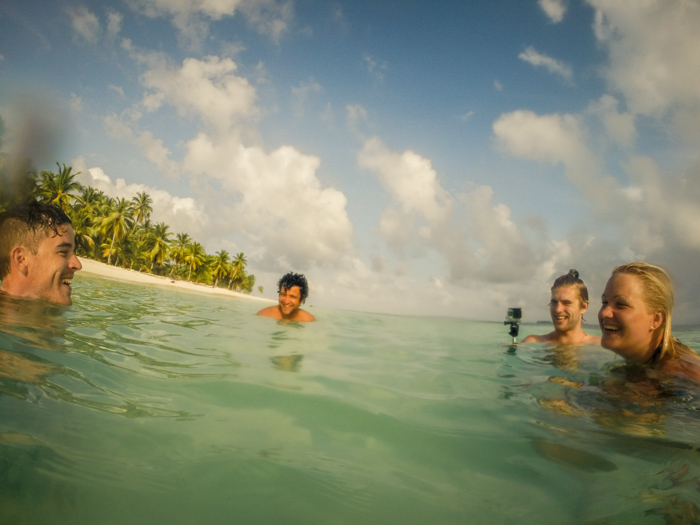
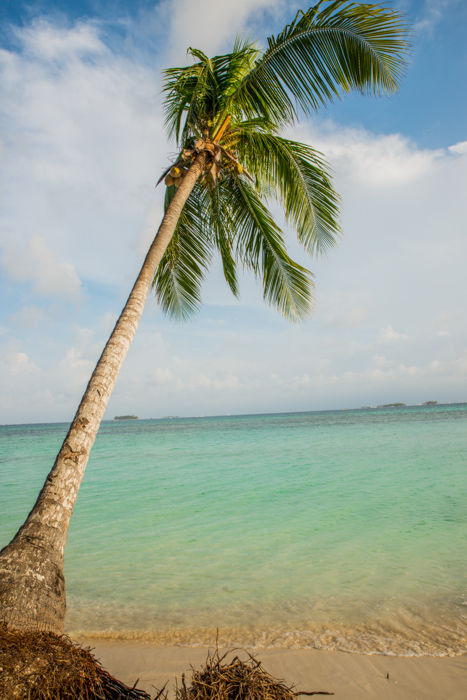

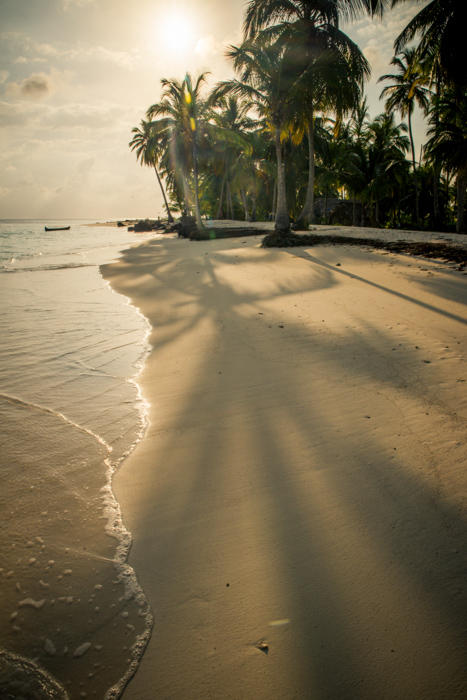
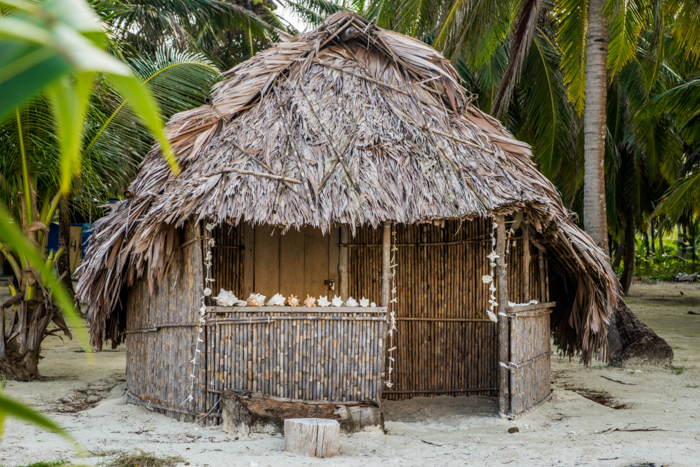
All eight of us stayed in this hut
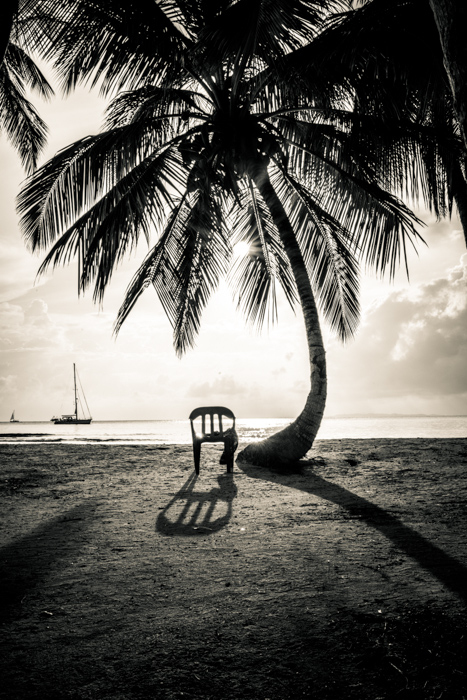
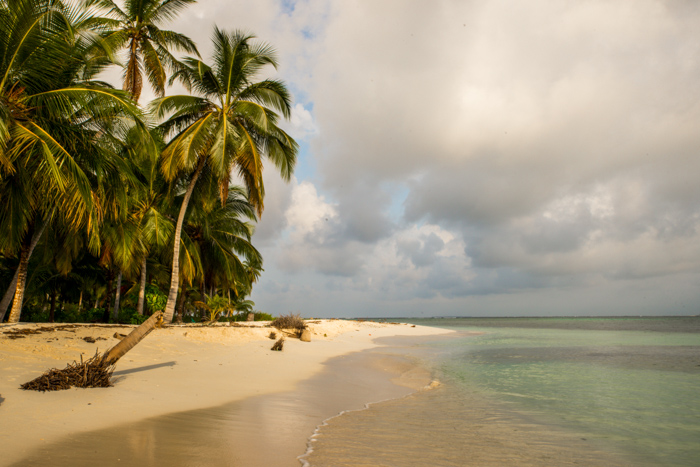
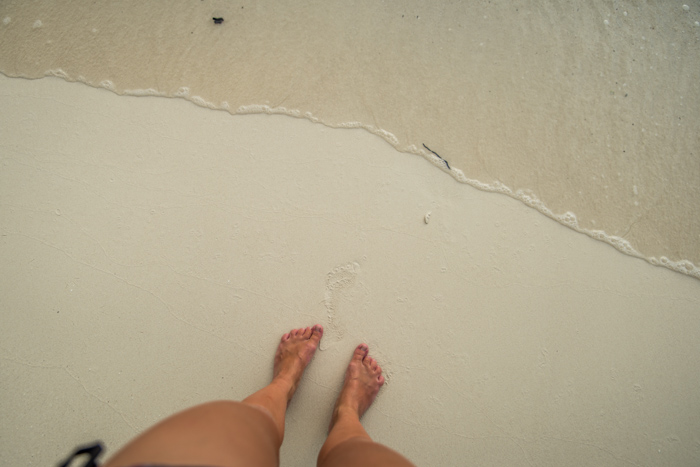
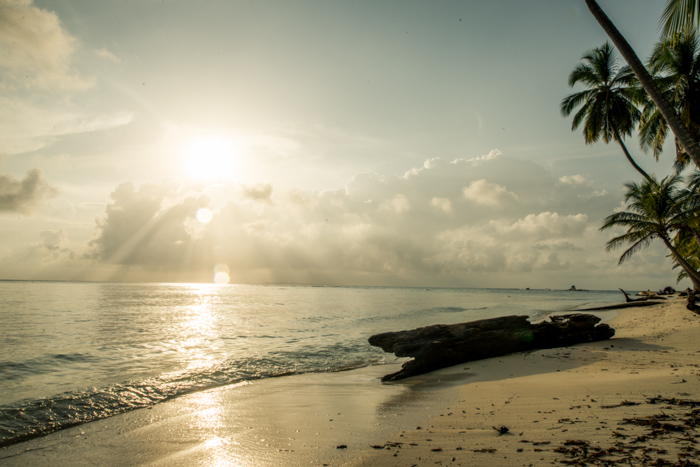
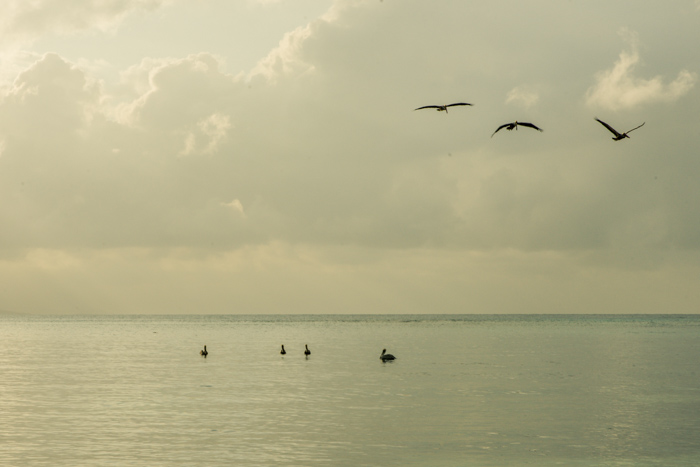

Nästa dag gick taxibåten tidigt tillbaka till fastlandet. Även denna hade kaptenen på Dolphin Solo lagt ut pengar för. Däremot blev det problematiskt när vi kom i land, ingen av oss åtta hade ju pengar till jeepen som skulle köra oss två timmar till Panama City. Dealen var att vi skulle ta ut pengar i Panama City och betala då, men de ville ha betalt i förskott. Efter att ha förklarat storyn för alla var det en snäll chaufför som lånade ut pengar till oss tills vi kom till en bankomat. Jag har aldrig varit så glad över att se en bankomat förut. Jag har heller aldrig varit så glad för att komma till en storstad tidigare. Vår sista motgång på detta äventyr var att alla hostel i hela staden var så gott som fullbokade. Vi fick sätta oss i ytterligare några timmar och leta efter någonstans att bo. Tillslut hittade alla ett hem för natten och vännerna spreds ut till olika delar av staden.
Vi var tillbaka i tid, trots att det tagit oss ett dygn mer än planerat och ett dygn mindre på Ave Maria. Efter alla dessa motgångar kunde vi tillsut möta upp vår bror som flög från Sverige till Panama City.
Paul är nu bannad från seglingsföretagen.
English version
The next day the taxi boat took us back to the mainland, early in the morning. Even this the Dolpin Solo captain payed for. It became problematic when we came ashore, though none of the eight of us had money to pay the jeep that would take us to Panama City. The deal was that we should withdraw money in Panama City and pay afterwards, but they wanted us to pay in advance. After explaining the whole story for everyone, a friendly driver lent us money until we came to an ATM. I've never been so happy to see an ATM before, and I've never been so happy to get to a big city before. Our last misfortune on this adventure was that every hostel in the whole town was almost fully booked. We had to spend another few hours to look for somewhere to live. Eventually we all found a home for the night and the friends were spread to different parts of the city.
At the end, we were back in time, even though it took us one day more than planned and one day less at Ave Maria. After all these misfortunes, we could finally meet up with our brother who flew from Sweden to Panama City.
Paul is now banned from all the sailing companies.
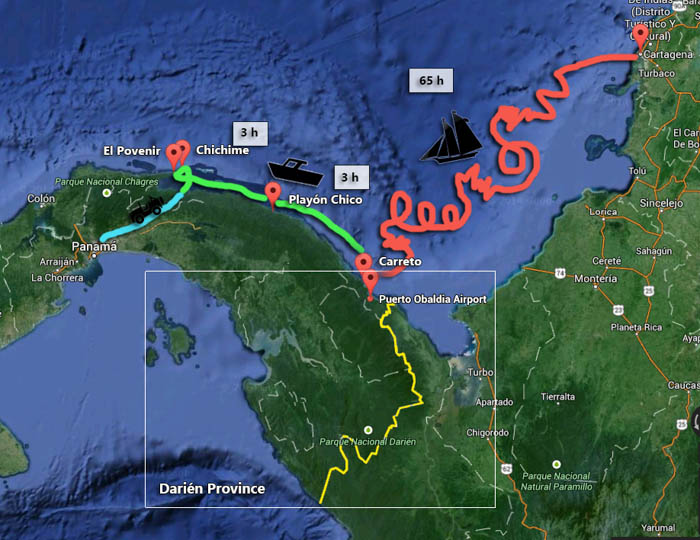
This is a map of our journey. We started in Cartagena and sailed for 65 hours to Carreto. Back and forth and in cirkles. If you go from Cartagena to the border with bus, it's 10 hours, then 2,5 hours to Carreto by foot. However, the airport that Paul wanted us to go to is called Puerto Obaldia, and it's almost on the border. Then we took a speedboat to Playon Chico, 3 hours, for a random home stayover, and then another 3 hours to El Povenir to get our passports stamped. We had one night at the island Chichime before we went back to the mainland and drove to Panama City.
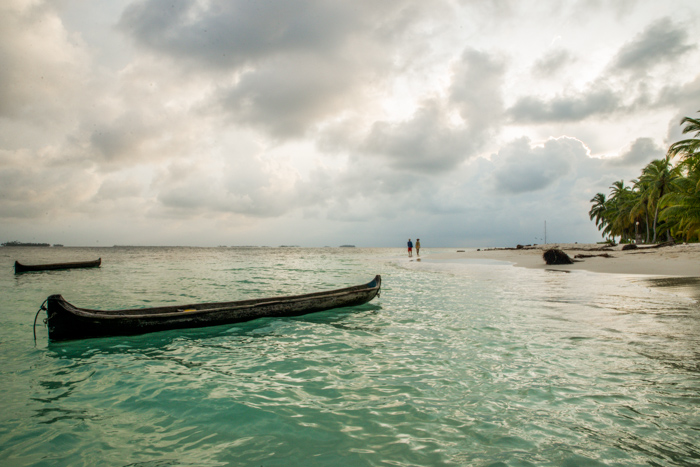
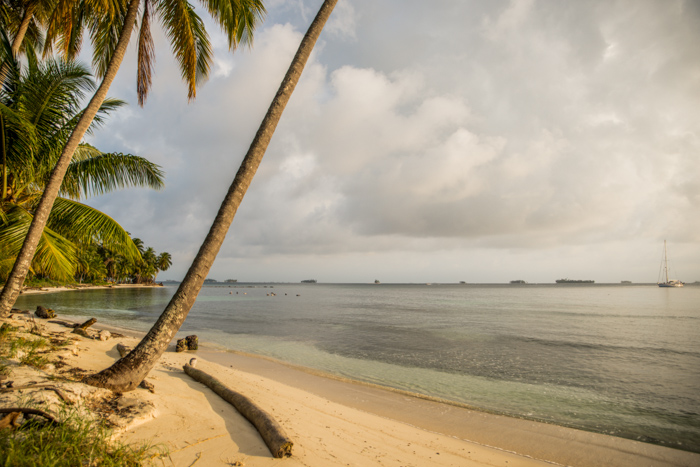
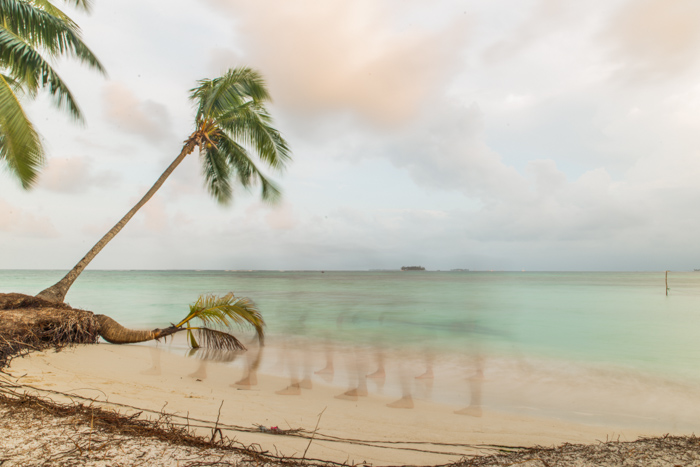
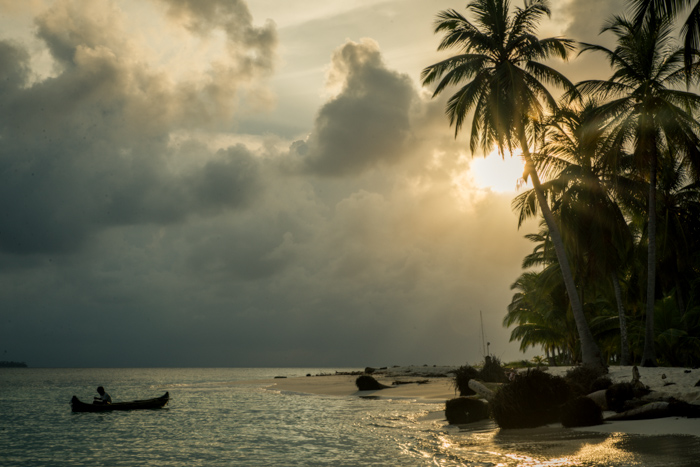
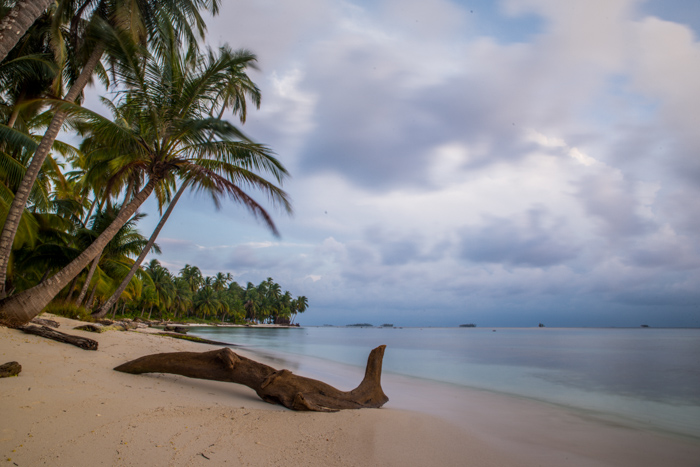
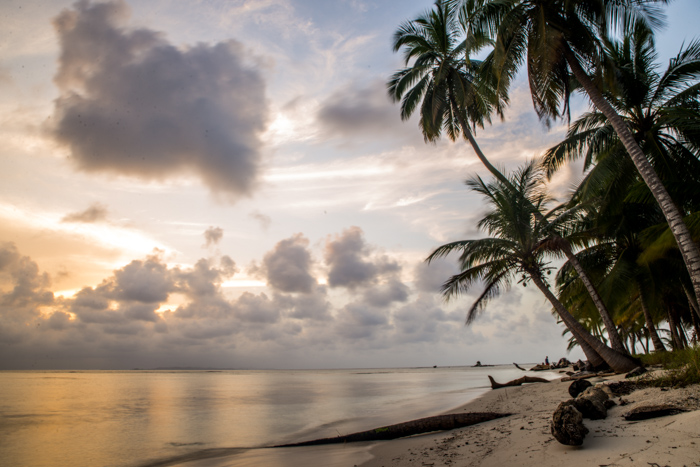
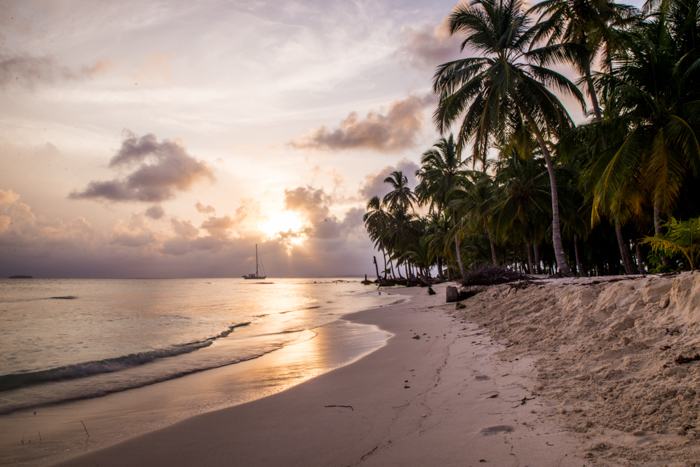
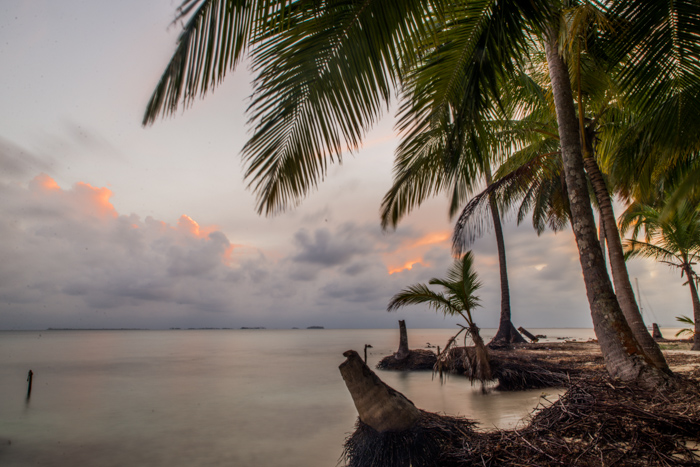
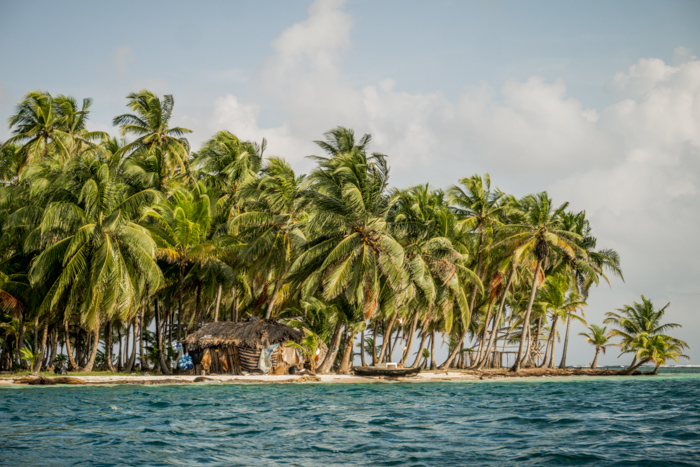
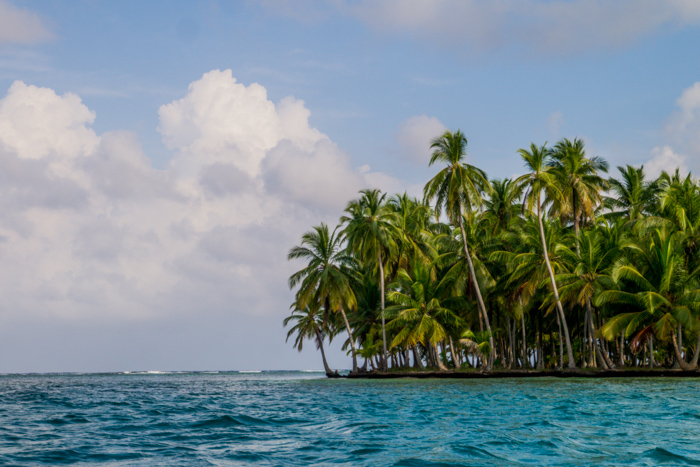
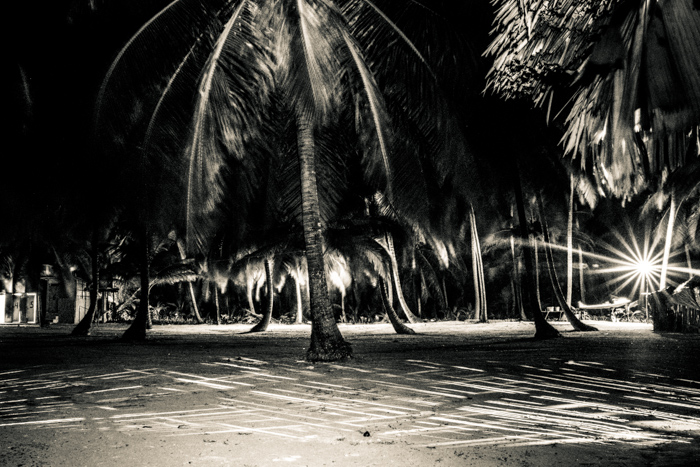
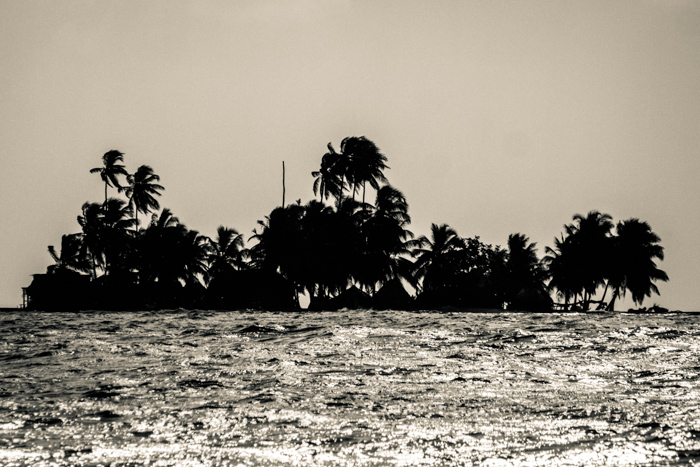
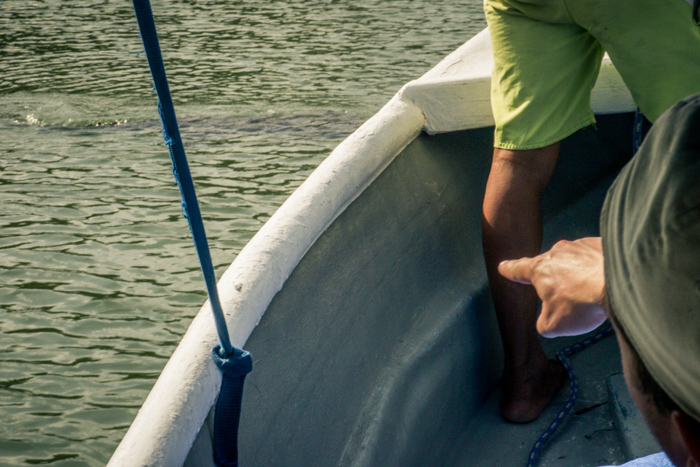
On the way back to mainland we runned over a crocodile
The End
Time to abandon Ave Maria2014-12-25 22:41:41
Vi körde in i ett par stora stockar den natten, som smällde till fören precis under där jag skulle försöka sova. Jag bara väntade på att vi skulle köra in i en container som något fartyg tappat. Vi körde aldrig in i någon container, men däremot small motorn till igen. Det var ingen som vågade höra sig för om vad som försegick, så vi sov vidare. Jag vaknade av att ankaret kastades ut, så jag hoppade upp ur bingen för att se var vi var. Det var fortfarande bäcksvart, det hade inte gått mer än två timmar.
Vi var tillbaka i samma vik.
Växellådan hade gått sönder den här gången, så Paul bestämde att det var säkrast att åka tillbaka till samma plats. Det var hopplöst, Paul skulle aldrig lyckas laga motorn utan hjälp. Hur säkert det nu var att övernatta i viken där Kuna folket ville bli av med en fortast möjligt är en bra fråga. Vi blev i alla fall inte kapade den natten, Kuna folket lämnade oss ifred.
Nästa dag, vaknade alla tidigt och funderade på vad som skulle hända härnäst. Paul och Sindry tog sovmorgon medans alla vi andra var stressade för att vi var inne på dag fyra av fem och vi hade fortfarande inte nått fram till San Blas. Tillslut berättar han att vi alla skulle försöka hitta ett annat transportsätt. Efter att Sindry kokat Paul ett antal koppar kaffe kunde hon äntligen följa med oss till byn för att hjälpa till att prata med byborna. Återigen fick vi inte använda motorn, och den här gången låg vi ankrade mycket längre ut så det tog en evighet att nå land.
Att ta oss ifrån Carreto via landvägen var det inte frågan om, för det var farligt. Dessutom hade Paul stämplat ut våra pass åt oss i Cartagena i Colombia, och vi var laglösa ute på havet ända till vi skulle nå en immigrationsö där han skulle stämpla in oss. Enligt ett dokument var vi passagerare på Ave Maria och var därför tvugna att bli instämplade från havet, inte vid någon landkontroll. Paul tyckte att vi skulle försöka ta oss till Puerto Obaldia, en flygplats som inte var så långt bort för att bli instämplade där och flyga därifrån. Hur gärna vi än ville lämna Ave Maria, så var vi tveksamma på det alternativet. Vem skulle betala för flygbiljetterna? Sindry pratade med Kuna-folket men det verkade inte finnas några tillgängliga båtar till varken flygplatsen eller den immigrationsön som vi enligt plan A skulle åka till. Det enda hoppet vi hade var en liten mobiltelefon som en Kuna-kvinna hade tejpat fast på en bambuvägg. Det var den enda platsen i hela byn med mottagning, men bara på just den telefonen. Vi hade inte kunnat kontakta någon tidigare, ingen visste var vi var eller vad som hade hänt. När vi nämde för Sindry att vi skulle försöka kontakta företaget, Blue Sailing, som vi köpt resan av, blev hon upprörd och hoppade i en kanot och bad en lokal att ro ut henne till Ave Maria. Hon tyckte att det var viktigare att laga lunch ifall att vi började bli hungriga istället för att lösa problemet.
Vi kom tillslut fram till Blue Sailing och en kvinna som heter Laurel. Megan bad om hjälp med skärrad röst och berättade allt vi varit med om. Laurel ville hjälpa oss, hon behövde bara ett bekräftande samtal från Paul. Vi var glada att ha fått prata med någon annan utanför Ave Maria, men bekymrade över hur vi skulle berätta för Paul att vi involverat Laurel eller hur vi ens skulle få han att ta sig i land för att ringa till henne. Vi var oroliga för att han skulle bli hotfull och aggressiv. Han ville ju inte förstöra sitt rykte för det skulle såklart gå emot hans business.
Vi gaddade ihop oss för att våga berätta om Laurel för Paul, rodde tillbaka och möttes av en speedboat som låg intill Ave Maria. Tydligen hade Sindry lyckats organisera en båt under tiden vi ringde till Laurel. Speedboat föraren förklarade att det inte alls var en bra idé att åka till flygplatsen, där väntade en massa kubaner på att få lämna landet och det kunde ta veckor innan man kunde få plats på ett flyg. Desstuom var det väldigt farligt, och det låg på gränsen till Colombia. Det var först då vi förstod hur nära gränsen vi var – vi hade alltså knappt kommit någonstans. Det hade tagit oss 65 timmar att segla en sträcka som hade tagit lite mer än 10 timmar med buss. Speedboat-kaptenen tyckte istället att vi skulle åka till immigartionsön, El Povenir. Det var även det alternativet som Laurel gett oss, men hennes båt skulle gå nästa morgon. Nu hade vi en båt precis framför oss, problemet var bara pengar. Laurel skulle anordna allt åt oss, vi skulle inte behöva betala någonting. Men Paul var inte glad av att höra att vi dragit in Laurel i sörjan. Trevor började ifrågasätta Paul och hans olika såkallade plan B, C och D.
- I can hear that your tone has turned more aggressive since you’ve spoke to Laurel. If you don’t turn that tone down I’ll fucking slam you Trevor! hotade Paul.
Som vi trodde blev Paul väldigt aggressiv, han var stressad, arg och frustrerad. Vi skulle komma överens om vi ville ta Sindrys alternativ och åka med det samma, eller vänta på Laurels alternativ nästa morgon.
- You don’t want to spend another 24 hours here, do you!? fortsatte Paul med en hånfull stämma. After Thursday you are not my problem anymore. You are backpackers, not tourists, you can work this out, fortsatte han.
Vi kände oss så gott som tvungna att lämna Ave Maria och vi ville heller inte stanna där, även om vi fortfarande hade en natt kvar som vi betalat för och måltider kvar att äta. Vi hade inte tillräckligt med pengar till att betala speedboat kaptenen. Ingenstans på öarna skulle det finnas bankomater, och många av oss hade bara några få dollar på oss. När vi alla skrapat ihop allt vi hade i dollar och Colombiska pesos, hade vi en total på $450. Båten skulle kosta oss $700 så det fattades fortfarande en hel del pengar. Efter många försök till att pruta ned priset från Paul och Sindrys sida, hade Paul inget annat alternativ än att ge oss de restrerande pengarna. Han gav oss 400 000 Colombiska pesos, vilket motsvarar $160. Vi var fortfarande $90 dollar kort. Speedbåt chauffören sa åt Sindry att vi inte skulle ha möjlighet att åka direkt till El Povenir den kvällen, det skulle bli mörkt och farligt att åka så han tyckte att det var bättre om vi väntade till nästa morgon. Men det örat ville de inte lyssna på och trots att vi fortfarande inte hade tillräckligt med pengar för båten, skickade de iväg oss.
English version
We sailed over a couple of large logs that night, which slammed into the bow just below where I would try to sleep. I was just waiting for us to run into a container that some vessel had left behind. We smashed any container, but the engine smacked again. No one dared to find out about what was happening, so we slept on. I woke up when the anchor was thrown out, so I jumped out of the cabin to see where we were. It was still pitch black, it had not been more than two hours.
We were back in the same bay.
The gearbox had broken this time, so Paul decided to go back to the same spot. It was hopeless, Paul would never manage to fix the engine without help. How safe it was to spend the night in the bay where the Kuna-people wanted to get rid of us as soon as possible is a good question. We were however never robbed, the Kuna people left us alone. The next day, everyone woke up early and wondered what would happen next. Paul and Sindry slept in while the rest of us were stressed because we were already at day four of five and we still had not reached the San Blas. Eventually he told us that we should all try to find another type of transport. After Sindry made Paul a number of cups of coffee, she could finally go with us to the village to help to talk to the villagers. Again, we did not use the engine, and this time we lay anchored much further out so it took forever to reach the shore.
We could not leave Carreto by land, that was too dangerous. Besides, Paul had stamped our passports in Cartagena in Colombia, and we were outlaws at sea until we would reach an immigrationisland where he would stamp us in. According to a document we were passengers on the Ave Maria and therefore had to be stamped from the sea, not by any country control. Paul thought that we should try to go through Puerto Obaldía, an airport that was not very far away to be stamped in there and then fly from there. We really wanted to leave Ave Maria, but we didn't like that option. Who would pay for the airline tickets? Sindry talked to the Kuna-people, but it didn't seemed to be any available boats for either the airport or the immigrationisland. The only hope we had was a small cell phone as a Kuna-woman had taped on a bamboo wall. It was the only place in the whole village with reception, but only on that particular phone. We had not been able to contact anyone before, no one knew where we were or what had happened. When we named for Sindry that we would try to contact the company we've made the booking thorugh, she became upset and jumped into a canoe and asked a local to row her out to Ave Maria. She thought it was more important to cook lunch if we started getting hungry instead of solving the problem.
We finally got through to the company and a woman named Laurel. Megan asked for help with a jumpy voice and told her everything we had been through. Laurel wanted to help us, she just needed a confirmation call from Paul. We were pleased to have been talking to someone else outside the Ave Maria, but worried how we would tell Paul that we involved Laurel, or how we would even get him to go ashore to call her. We were worried that he would be hostile and aggressive. He did not want to ruin his reputation because it would obviously go against his business.
We went together to dare to tell Paul about Laurel, rowed back and was greeted by a speedboat that was next to Ave Maria. Apparently Sindry managed to organize a boat during the time we called Laurel. The speedboat driver explained that it was not a good idea to go to the airport. There were a lot of Cubans who wanted to leave the country and it could take weeks before an available seat. Besides it was very dangerous, and it was on the border to Colombia in the Darién Gap. Just then we realized how close to the border we were - we had barely moved somewhere. It had taken us 65 hours to sail a distance that had taken a bit more than 10 hours by bus. The speedboat-captain instead sugested us to go to the immigartionisland, El Povenir. We also had the option that Laurel gave us, but her boat would leave the next morning. Now we had a boat right in front of us, the problem was just money. Laurel would organize everything for us, we would not have to pay for anything. But Paul was not happy to hear that we brought Laurel into all of this. Trevor began to question Paul and his various so-called plan B, C and D.
- I can hear that your tone has turned more aggressive since you've spoke to Laurel. If you do not turn that tone down I'll fucking slam you Trevor! threatened Paul.
As we thought Paul got very aggressive, he was stressed, angry and frustrated. We voted if we wanted to take Sindrys options and go just then, or wait for Laurels options next morning.
- You do not want to spend another 24 hours here, do you!? Paul continued with a sneering voice. After Thursday you are not my problem anymore. You are backpackers, not tourists, you can work this out, he continued.
We felt forced to leave Ave Maria and we did not want to stay there, even though we still had one night as we had paid for and meals left to eat. We did not have enough money to pay the speedboat captain. Nowhere on the islands had ATMs, and many of us had only a few dollars on us. As we collected all the money that we had, dollars and Colombian pesos, we had a total of $450. The boat would cost us $700 so we still needed a lot of money. After many attempts to haggle the price down by Paul and Sindrys, Paul had no other alternative but to give us the rest of the money. He gave us 400,000 Colombian pesos, which equals $160. We were still $90 short. The speedboat driver told Sindry that we would not be able to go directly to El Povenir that evening, it was a long journey so it would be dark and dangerous before arriving. He thought it was better if we waited til the next morning. But this they did not want to listen to and even though we still didn't have enough money for paying the boat, they sent us away.

So happy to finally leave Ave Maria
Så fort vi kommit iväg en bit förklarade speedboat-kaptenen för oss att vi bara kunde åka halvvägs den kvällen. Vi skulle vara tvugna att övernatta på en annan ö. Vi förklarade att vi inte hade pengar att betala för boende, de enda pengarna vi hade var hans och då skulle vi vara tvugna att betala med dem. Men den här kaptenen visste vad han pratade om, och det var inte frågan om att vi skulle åka när det var mörkt. Han körde oss till ön Playon Chico. Som han hade sagt var det mörkt när vi kom dit, och vi möttes av hans vänner med öppna armar. De ville gärna hjälpa oss med boende för en billig peng. För $5 var fick vi bo i tältsängar och hängmattor i en hydda. Vi bjöd dem på öl och rom och de satte igång och lagade kokosris åt oss. Vi hade verkligen inga pengar men dessa människor ville bara hjälpa oss, de är nog de vänligaste människorna jag någonsin mött.
- Mi casa es su casa, somos hermanos, sa mannen som kom med kokosris till oss. "Mitt hem är ditt hem, vi är alla bröder".
De blev allt fler och fler, hela familjen ville vara med och se vad vi var för konstiga filurer. När kamerorna åkte fram blev det fotofest. Alla ville vara med på bild. Vi somnade tidigt den kvällen, vi fick inte gå utanför hyddan för det var inte säkert för oss att vistas där. Det var också väldigt lyhört då alla hyddor är byggda av gles bambu så det var som att bo ihop med hela byn.
Vi är oerhört tacksamma för alla dessa hjälpsamma medmänniskor, och som tack för allt kommer vi skicka en massa bilder till dem och tala gott om deras by och hyddan vi bodde i. För den som planerar att besöka ön Playon Chico i Kuna Yala, San Blas, ta kontakt med Emiliano Alvila, hans familj är helt underbar!
English version
As soon as we got out of the bay, the speedboat captain explained for us that we could only go halfway that evening. We would have to spend the night at another island. We explained that we did not have any money to pay for accommodation, the only money we had was his money and in that case we would have to pay with them. But this captain knew what he was talking about, and there was not even questionable to go in the dark. He drove us to the island called Playon Chico. As he had told us it was dark when we arrived and we were greeted by his friends with open arms. They wanted to help us with accommodation for a low price, only $5 each. We got to stay in camp beds and hammocks in a hut. We invited them for beers and rum, and they began to cook us coconut rice. We really had no money but these people just wanted to help us, they are probably the friendliest people I've ever met.
- Mi casa es su casa, somos hermanos, said the man who brought us the coconut rice. "My home is your home, we are all brothers."
More people showed up, the whole family wanted to see what kind of strange fellows we were. When we ut up our cameras, a photoshoot took place. Everyone wanted to be in the pictures. We went to sleep early that night, we were not allowed to go outside the hut because it was not safe for us.
We are extremely grateful for all these helpful fellow human beings, thanks for everything, we will send a lot of pictures to them, and spread a good word about their village and the hut we stayed in. For those planning to visit the island Playon Chico in Kuna Yala, San Blas , contact Emiliano Alvila, his family is absolutely wonderful!

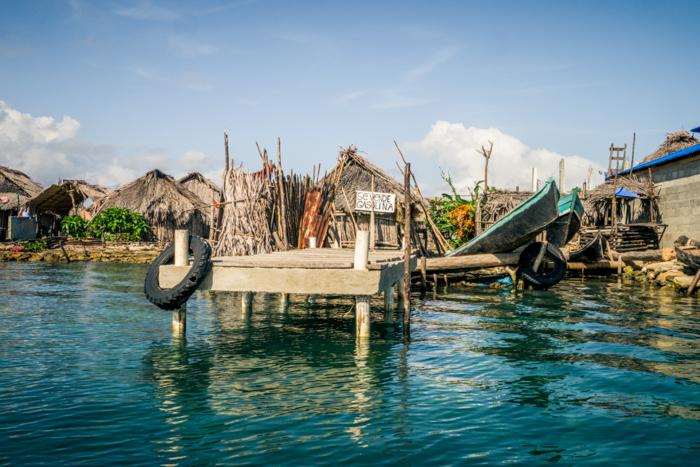


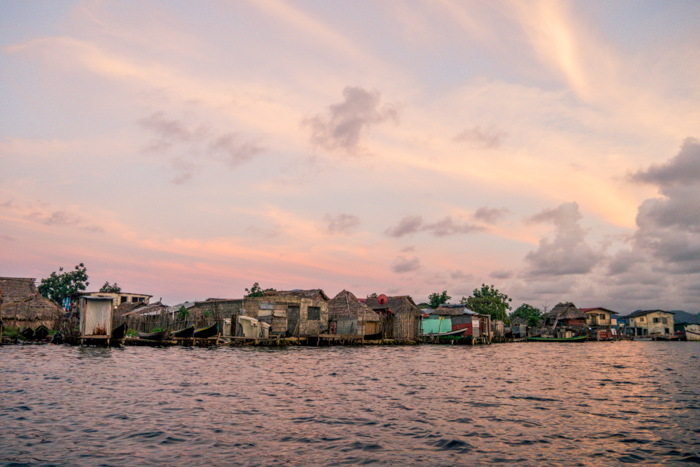
We stayed in this village

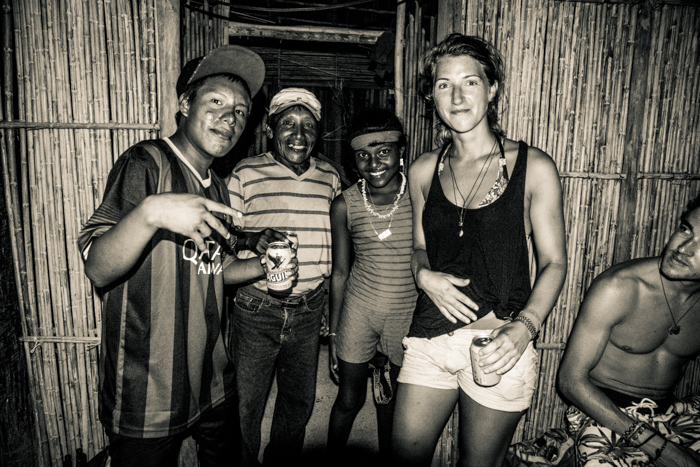
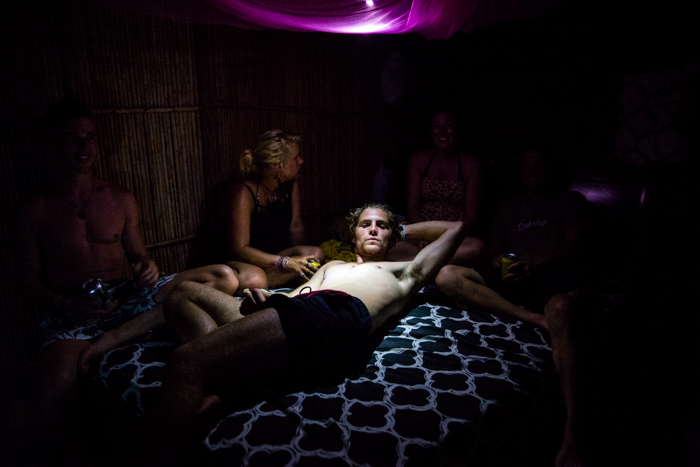
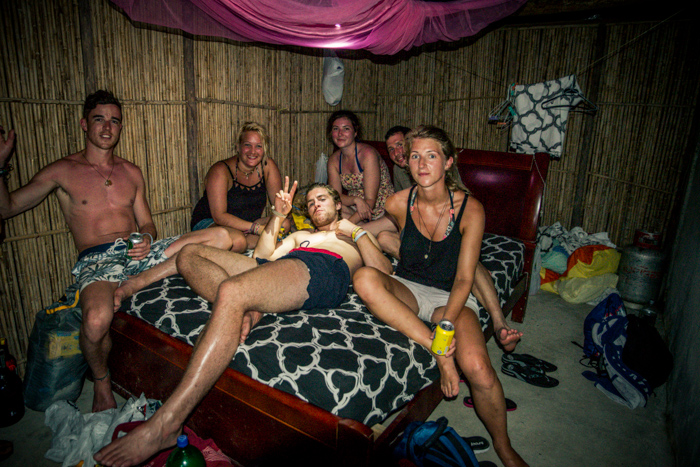

We got some wonderful coconut rice


First time touching land after 65 hours at open sea2014-12-25 19:02:00
Det gick inte fort den där natten. Förväntansfulla vaknade vännerna och stack ut huvudena från varenda lucka för att se hur långt vi hade kommit. Till vår stora besvikelse hade inte de där landremsorna vi skymtat kommit mycket närmre. Vinden var fortfarande obefintlig och vi alla insåg att det skulle ta ytterligare ett dygn för att komma fram – eller till och med veckor. Det började kännas väldigt motigt, det verkade som om vi aldrig skulle komma fram.
English version
We were not moving fast that night. The friends woke up all excited to see how far we had come. To our great disappointment the land we glimpsed had not come much closer. The wind was still non-existent and we all realized that it would take an additional day to arrive - or even weeks. We began to feel hopeless, it seemed like we would never arrive.
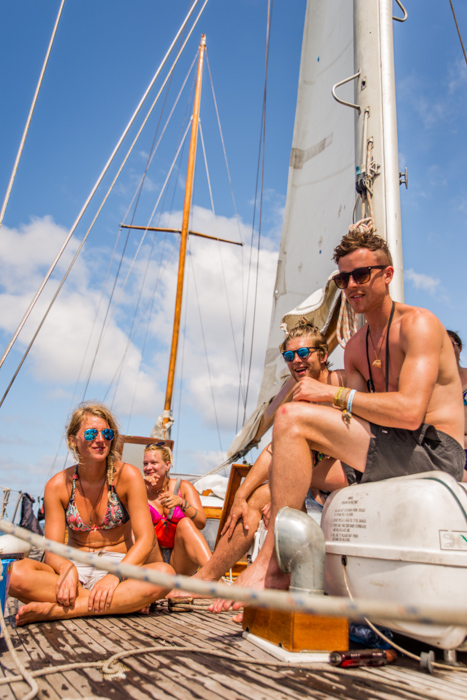

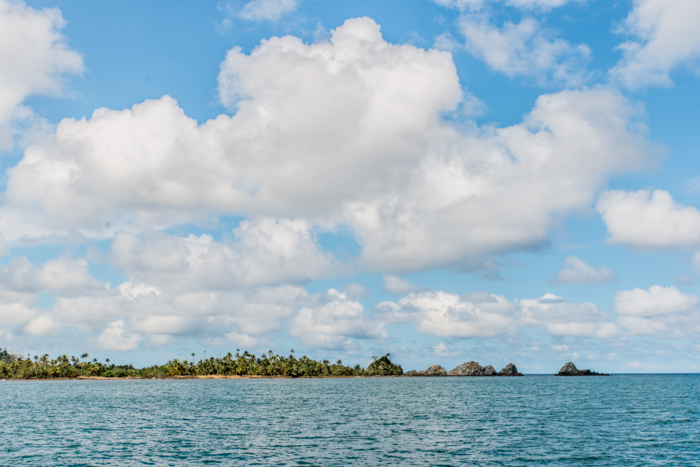
Paul började segla i cirklar. Han menade att han var tvungen att hämta vind längre ut för att få fart. Seglingssystrarna tittade fundersamt på varandra och undrade hur seglingsteknikerna fungerade i Australien. Men eftersom vi var tjejer, så hade vi inget att säga till om.
Efter halva dagen började Paul klia sig i huvudet, han tyckte att vi skulle vända tillbaka en bit för att gå i hamn så att han kunde laga motorn. Han började fiffla med motorn igen så att vi skulle kunna komma någonstans, och äntligen började den där landremsan närma sig. Motorn hostade på och lyckades ta oss hela vägen in till en vik vid fastlandet, utanför Kuna-byn Carreto.
- First, I’m going to sleep, and then I’ll try to fix the engine ok? Sa Paul när vi lagt oss för ankar.
Han tyckte att vi skulle ro i hamn för att utforska stället, och vi var alla vädligt exalterade av att få komma i land efter 65 timmar på det öppna havet. Paul hade dock aldrig varit i Carreto, men han påstod att det var början av San Blas skärgården. Vi fick läsa den enda lilla kvadraten som stod om byn i hans hamnbok. Där stod det att byborna är vänliga så länge man försöker ta sig därifrån fortast möjligt. Om man skulle ta en kokosnöt eller banan skulle man anklagas för stöld. Vi blev lite osäkra om detta var en bra idé när vi såg människor smyga omkring i buskarna längs med stranden, men Paul schasade iväg oss.
Vi hoppade i den läckande gummijollen som knappt hade någon luft kvar i sig, så vi fick en ofungerande pump att försöka pumpa upp den med. Med hjälp av en plastpåse, en massa tid och lite trix gick det att få någorlunda ordning på den. Vi fick en åra, men motorn ville han inte sätta på. Vi rodde på för glatta livet, en med den enda åran och resten med våra cyklop eller bara händer. Det var stark ström så vi drev i sidleds, men tillslut kom vi fram. Till vår enorma besvikelse var det första vi beskådade ett berg av skräp. Hela stranden var full av plasflaskor, burkar, annat skräp och en massa matrester som en flock gamar satt och gnagde på. En Kuna-kvinna gick precis ned till stranden med två hinkar skräp som hon hällde ut mitt framför ögonen på oss. Detta var inte riktigt det San Blas vi hade förväntat oss.Vi försökte ändå underhålla oss själva genom att bada och snorkla, men det enda vi såg var fyra fiskar och en skräptäckt botten.
English version
Paul started to sail in circles. He meant that he had to retrieve wind further out to gain speed. The sailing sisters looked thoughtfully at each other and wondered how sailing techniques worked in Australia. But since we were girls, we had nothing to say.
At mid-day, Paul began scratching his head, he thought we should turn back a bit to go in to a bay so that he could fix the engine. He began fiddling with the engine again so that we could get anywhere, and that strip of land was finally starting to approach. The engine coughed on and managed to take us all the way to a bay at the mainland, outside the Kuna village Carreto.
- First, I'm going to sleep, and then I'll try to fix the engine ok? Paul said when we put out the anchor.
He thought we should row in to the beach and explore the place. We were all very excited to come ashore after 65 hours on the open sea. Paul had never been in Carreto, but he said it was the beginning of the San Blas Archipelago. We got to read the only small square that was readable about the village in his guide book. It said that the villagers are friendly as long as you try to get out of there as quick as possible. If one were to take a coconut or banana he would be accused for steeling. We were a bit unsure if it was a good idea to visit when we saw people sneaking around in the bushes along the beach, but Paul hushed us away.
We jumped into the leaking dinghy that barely had any air left, so we got an unfunctional pump to try and pump it up with. Using a plastic bag, a lot of time and some tricks we got it in a reasonable shape. We got one oar, but the engine he did not want to put on. We rowed on for our lives, one with the single oar and the rest of us with our facemasks or bare hands. There was a strong current so we drove sideways, but eventually we got there. To our disappointment the first thing we saw was a mountain of garbage. The whole beach was full of bottles, cans and a lot of leftovers where a flock of vultures sat and ate. A Kuna woman just went down to the beach with two buckets of garbage that she poured out right in front of us. This was not quite the San Blas we had expected. We still tried to entertain ourselves by swimming and snorkeling, but the only thing we saw was four fishes and junk covering the ground.
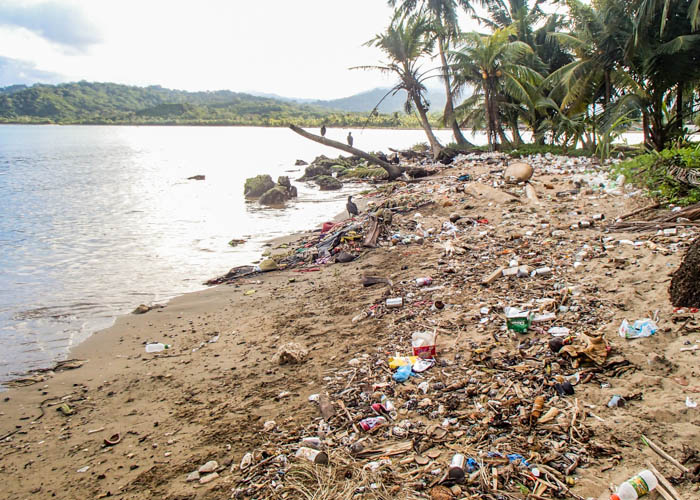


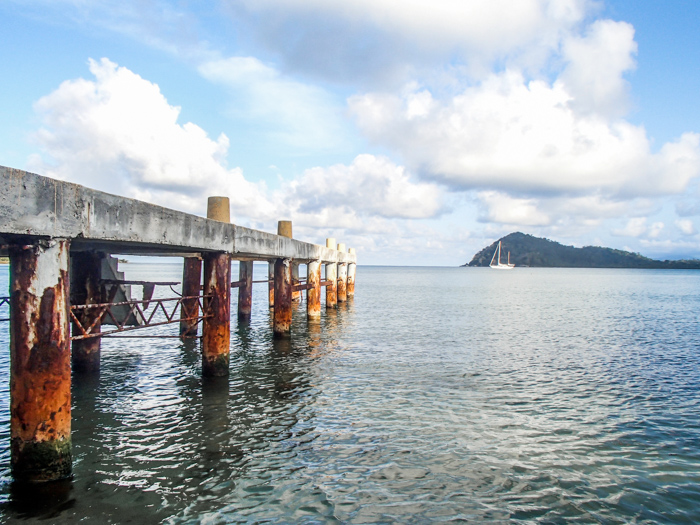
Paul tyckte att vi skulle besöka byn, men vi var lite osäkra på om det var en bra idé. Vi bestämde oss i alla fall för att gå dit och köpa en varsin läsk. Det var mycket märkligt att gå in i den där byn, alla vi åtta gringos. Det där Kuna folket hade nog inte skådat turister många gånger i sina liv. Vi var beredda på att vända, men de vinkade in oss till kiosken. Där fick vi köpa oss en varsin läsk, de överöste oss med plaststolar så att vi kunde sitta och ha en trevlig stund och hela byns barn flockade sig runt oss. De stod och hängde längs staketet och bara tittade. Vi försökte prata med dem, men de kunde ingen spanska och blev väldigt blyga, de flinade och gömde sina ansikten bakom händer och hår. De var extremt nyfikna och någon bad dem att visa oss runt i byn. Ett gäng på 10 – 15 barn i alla olika åldrar sprang hand i hand framför oss, fnittrande, och tog oss runt bland labyrintgångar emellan hyddorna. Byn bestod av små skjul byggda av bambu pinnar med vasstak. Det var väldigt mysigt och genuint. Vi blev visade till olika Kuna familjer som alla ville titta, känna och skratta åt oss. Vi var betydligt mycket större än deras folkslag, så de grabbade tag i våra armar och kallade oss för ”gorditas” - en komplimang för tjockis. De skrattade också åt våra fötter, men det var oklart vad som var så roligt med dem. Själva bar dem färgglada klänningar, de hade armband i gult och rött på hela underarmarna och smalbenen, samt en piercad tjurring i näsan. De ville absolut inte vara med på bild, men barnen var desto mer nyfikna på våra kameror. Det var en helt unik upplevelse att möta det vänliga folket, men det var också lite skrämmande att inkräkta i deras by. När vi frågade var vi var sa de att vi var i Darién, och det visste vi att det inte bådade gott. Darién är en provins som man ska undvika för att det är så farligt, mycket droghandel och krimminalitet. Det var därför vi valde att segla över till Panama, att krossa gränsen över Darién gap är som att be om att bli kidnappad. Det var antingen segla eller flyga som gällde. Paul hade ljugit för oss, vi var inte alls i San Blas. Vi visste inte om barnen skulle ta oss till något obehagligt rum där vi skulle gå rätt in i en fälla, men jag antar att vi sett på för mycket film.
Picture of the Kunas from google
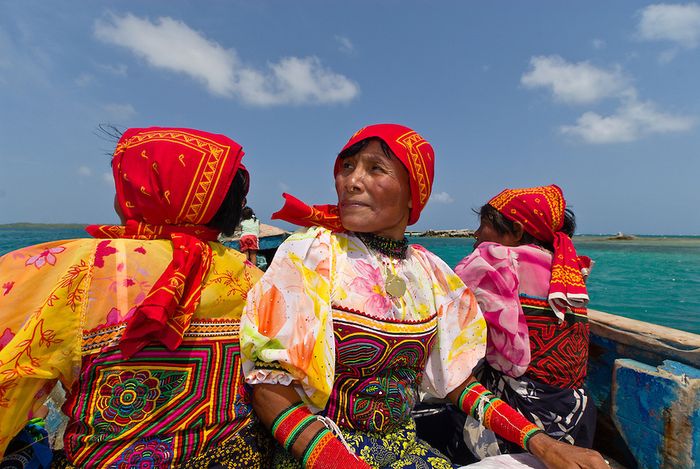
English version
Paul thought we should visit the village, but we were a little unsure whether it was a good idea. However we decided to go and buy a soda. It was very strange to walk into the village, all eight of us gringos. Those Kuna-people probably had not seen tourists many times in their lives before. We prepared to turn around, but they waved at us to come to the store. There we bought some sodas, they gave us plastic chairs so we could sit and have a nice time and every kid in the village gathered around us. They stood around the fence and just watched us. We tried to talk to them, but they didn't speak Spanish and were very shy, they grinned and hid their faces behind hands and hair. They were extremely curious and someone asked them to show us around the village.
A bunch of 10 - 15 children of all ages ran hand in hand in front of us, giggling, and took us around the maze paths between the huts. The village consisted of small shacks built of bamboo sticks with thatched roofs. It was very cozy and genuine. We were shown to various Kuna-families who all wanted to look at us, touch and laugh at us. We were a lot bigger than their people, so they grabbed our arms and called us "gorditas" - a compliment for fat. They also laughed at our feet, but it was unclear what was so funny about them. They wore colorful dresses, they had bracelets in yellow and red on their entire forearms and legs, and a pierced bull ring in their nose. They did not want to be photographed, but the kids were very curious about our cameras. It was a unique experience to meet these friendly people, but it was also a bit scary to intrude in their village. When we asked where we were, they said that we were in Darien, and we knew it did not bode well. Darien is a province that you should avoid because it's so dangerous, it consists a lot of drug trade and criminality. That was why we chose to sail over to Panama, to cross the border of the Darién Gap is like asking for being kidnapped. We could either sail or take a flight to Panama. Paul had lied to us, we were not at all in San Blas. We did not know if the kids would take us to an unpleasant place where we could walk right into a trap, but I guess we've seen too many movies.
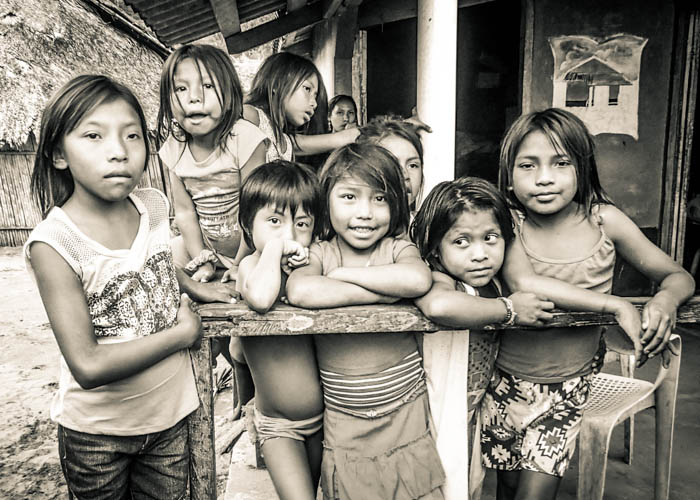



Vi rodde tillbaka till Ave Maria igen, och efter att vi fått vara på egen hand ett tag hade vi kunnat ventilera våra känslor med varandra. Vi visste nu att alla var missnöjda med hur resan tagit form, och vi började känna oss stressade för att vi aldrig skulle komma fram då merparten av oss hade ett schema att passa. När vi kom fram till båten hade Paul precis börjat mecka med motorn, lagom till att mörkret hade lagt sig. Vi fortsatte bada och för första gången hade vi möjlighet att duscha eftersom vi låg still. Vi var strikt förbjudna till att använda duschen i båten, eller ens tvätta händerna efter toabesök, men det kändes som att man kunde bli lite fräschare av att shampoonera sig i saltvattnet. Eftersom det var mörkt kunde man skymta plankton runt om sig, det var som en stjärnhimmel som glimrade så fort man rörde vattnet.
English version
We rowed back to Ave Maria again. After being on our own for a while we had been able to vent our feelings with each other. We now knew that everyone was unhappy with how the journey had taken shape, and we began to feel stressed because we would never arrive when most of us had a schedule to follow. When we arrived at the boat Paul had just started to fix the engine, just in time for the dark. We went swimming around the boat. For the first time we had the opportunity to shower because we were laying still. We were strictly forbidden to use the shower in the boat, or even wash our hands after visiting the toilet. We felt that we would get a bit fresher if we showered in the salt water. Because it was dark, we could catch a glimpse of the plankton around us, it was like a starry sky that glittered as soon as you touched them.
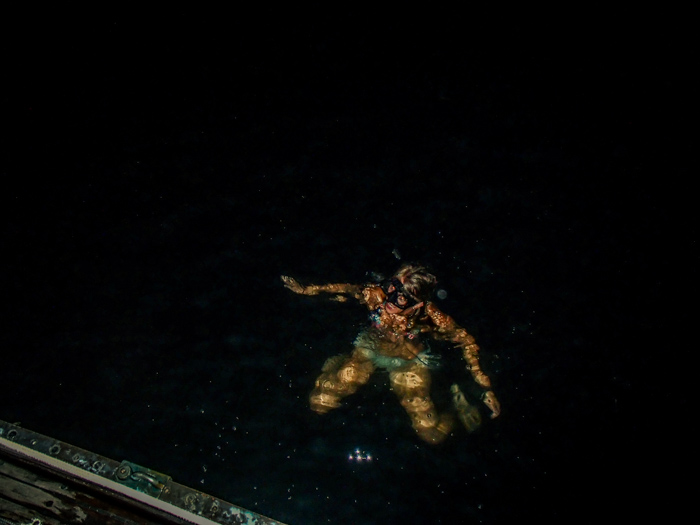
Christine swimming with planktons
När Paul äntligen var klar med motorn bestämde han att vi skulle ta oss ut till havs igen. Dock hade vi 15-20 timmar framför oss, så det gällde att vi satte fart. Hur de där fyra timmarna plöstligt kunde bli 20 är en obesvarad fråga. Vi var iallafall mer än samtyckande, så några av killarna började hjälpa honom att lämna hamnen. Vi andra blev ombedda att sätta oss inne i båten med alla lampor släckta, så det fanns inte så mycket annat att göra än att krypa till kojs. Paul började tjuvkoppla motorn så att gnistor flog åt alla hall och kanter, väldigt nära sängarna så att lakanen nästan tog eld. Det kändes verkligen inte bra längre, vi hade alla tappat förtroendet för Paul, även om förtroendet var minimalt från första början, och det kändes inte längre säkert att vistas på Ave Maria. Vi visste aldrig vad som försegick eftersom att han aldrig berättade någonting för oss.
Jag hade en klump i magen så jag gick fram och frågade vad som hände, var det verkligen säkert att ta sig ut mitt i natten med en motor som fortfarande inte verkade fungera? Paul blev arg och stressad, han sa åt mig att sluta ifrågasätta hans säkerhet, att jag skulle gå och lägga mig igen och att han bara var väldigt trött och frustrerad. Han tände en joint och menade att det är helt normalt att tjuvkoppla en motor på det viset och att allt som hänt är helt normalt, det är sådant som händer på sjön. Men då blev Megan också upprörd; om han nu var så trött så borde det vara en väldigt dum idé att ta sig ut på havet och förlita sig på killarnas icke existerande navigationskunskaper. Dessutom hade Paul nämnt att han själv var osäker på att navigera ut ur viken, eftersom att han inte hade tillräckligt med utrustning. Vi hade ingen ström ombord, så ingen av oss kunde ladda våra kameror som vi blivit lovade, och inte ens Paul kunde ladda sin laptop där han hade den enda kartan på båten. Han hade lite batteri kvar, så han startade datorn endast i nödfall.
- If the captain makes a decision, you can’t come and try to change that decision. Sa Sindry med en aggressiv ton.
Efter att jag och Megan hade blivit nedtryckta och bortschasade, lämnade Ave Maria viken och styrde kurs mot San Blas öarna.
English version
When Paul was finally done with the engine he decided that we would head out to sea again. However, we had 15-20 hours in front of us. How those four hours suddenly turned into 20 is an unanswered question. We were at least more than consenting, so some of the guys started helping him to leave the bay. The rest of us were asked to go inside the boat with all lights off, so there was not much else to do than go to bed. Paul began to jump start the engine so that sparks flew in all directions, very close to the beds so that the sheets almost caught fire. It really didn't feel great anymore, we all had lost confidence in Paul, even if the trust was minimal from the start, and it no longer felt safe staying at Ave Maria. We never knew what happened because he never told us anything.
I had a bad feeling in my stomach so I went up and asked what was going on, if it really was safe to go out in the middle of the night with an engine that still does not seem to work? Paul became angry and stressed, he told me to stop questioning his safety, I'd go to bed again, and that he was just very tired and frustrated. He took a joint of marijuana and said that it is quite normal to jump start a motor like that and that everything that happened was normal, things like these can happen at sea. Megan also got upset; if he was so tired, it would be a very bad idea to get out on the ocean and rely on the guys' non-existing navigational skills. In addition, Paul had mentioned that he himself was unsure to navigate out of the bay, because he did not have enough equipment. We had no power on board, so none of us could charge our cameras as we were promised, and not even Paul could charge his laptop where it had been the only map on the boat. He had some battery left, so he only started the computer in emergencies.
- If the captain makes a decision, you can not come and try to change that decision, Sindry said with an aggressive tone.
After me and Megan had been talked down to, Ave Maria left the bay and took course towards the San Blas Islands.
Stranded on the Caribbean Sea2014-12-24 17:12:00
Vi vaknade upp i våra plaskblöta sängar, tydligen läckte varenda fönster ombord in vatten. Uppspelta Danny ropade ”dolphins!”. Vi kastade oss ut på däck i den höga sjön och klamrade oss fast i relingen för att inte ramla överbord. En flock pigga delfiner gjorde oss sällskap en bit, de blev antagligen lockade av motorljudet då vi gått för motor hela natten utan segel. Delfinerna var dagens höjdpunkt, annars var det en ganska mjäkig dag ombord på Ave Maria. Vi hissade lite segel i form av en minimal trekant i focken, men annars dånade motorn på som vanligt. Sjön var fortfarande bråkig och vännerna kunde endast koncentrera sig på att titta ut över horisonten för att inte må illa. Men det gick att stå ut, vi visste att efter den andra natten skulle vi anlända de omtalade San Blas öarna.
English version
We woke up in our soaking wet beds, apparently every window on board was leaking water. Danny shouted out "dolphins!". We went out on the deck and cramped tightly to the railing to not fall overboard. A group of dolphins joined us for a bit, they were probably attracted by the sound of the engine though we had the engine on all night without sails. The dolphins were the highlight of this day, otherwise it was a rather mawkish day aboard on Ave Maria. We putted up a sail as a tiny triangle in the foresail, but otherwise the engine was roaring as usual. The ocean was still rowdy and the friends could only concentrate to look out over the horizon to not feel sick. But with the knowledge that after the second night we would arrive the famous San Blas Islands, it was ok.
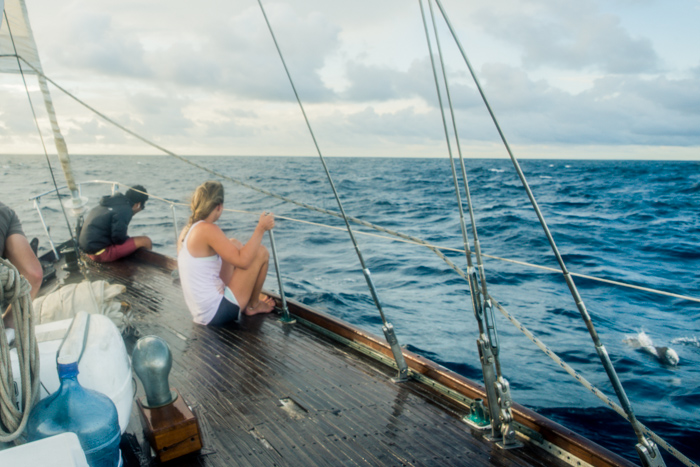
We watched dollphins up at deck (There is a dolphin in the right corner)
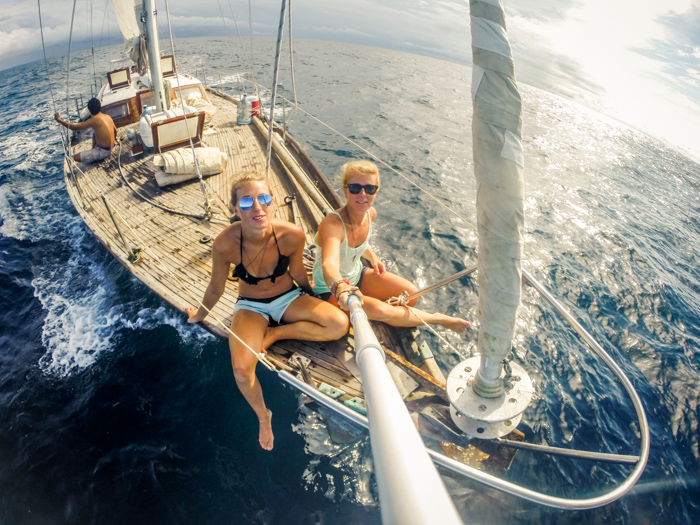
No sails out
Senare den kvällen fick vi reda på att vi varit fast i en hård motström under större del av tiden. Den hade sinkat oss med tre knops fart. Det var svårt att ta sig ur strömmen, så vi fick ändra kurs. Det innebar att vi inte skulle anlända förrän ett dygn senare än planerat, alltså tidig morgon på dag tre. Den nya informationen spred sig ombord och drog på ett bekymmersamt uttryck på varenda passagerare. Ytterligare ett dygn med sjösjuka vänner var kanske inte det högst önskbara, men det var bara att bita i det sura äpplet. Det fanns bara en sak att göra - som vi gjort de senaste dygnet - och det var att sova. Den där alkoholen skulle inte gå att förtära med de utmattade vännerna förrän vi stod med fötterna på stadigt land.
Tredje dagen hade vinden mojnat, så vi alla kunde ligga uppe på däck och sola hela dagen. Vi seglade för nästan fulla segel men även motorn puttrade på. Alla ombord hade börjat vänja sig vid båtens gungiga rytm vid det här laget, förutom stackars Megan som fortfarande var helt utslagen och inte hade ätit på två dygn. Plötsligt spred sig ett rykte ombord att vi kanske skulle kunna vara framme senare den kvällen. Vännerna tjoade och skålade med en öl. Detta var riktigt glada nyheter, och alla var väldigt pigga på att starta en lägereld på en strand för kvällen och kunna kommunicera med varandra utan en gröt i munnen.
English version
Later that night we found out that we were caught in a strong current that went against us during the mayor part of the time. The current had reduced the speed with three knots. It was hard to get out of it, we had to change course. This meant that we would not arrive until a day later than planned, ie early morning on day three. The new information was spread on board and put a worrisome face on every single passenger. One additional day with seasickness friends were perhaps not our biggest wish, but we just had to deal with it. There was only one thing to do - as we had done the past few days - and that was to sleep. That alcohol we would not be able to consume with these exhausted friends until we stood on steady ground.
The third day the wind had totally died, so we all could lie down on deck and sunbathe all day. We sailed nearly with full sails, but the engine also chugged on. All on board were starting to get used to the boat's rolly rhythm by now, besides poor Megan who was still completely eliminated, and had not eaten for two days. Suddenly a rumor got spread aboard that perhaps we would arrive later that night. The friends cheered and toasted with a beer. This was very good news, and everyone was very keen on making a bonfire on the beach for the evening and be able to communicate with each other without a porridge in the mouth.
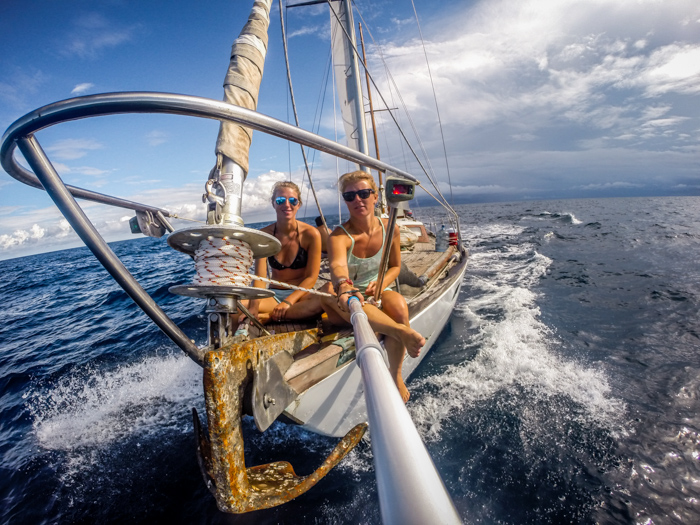
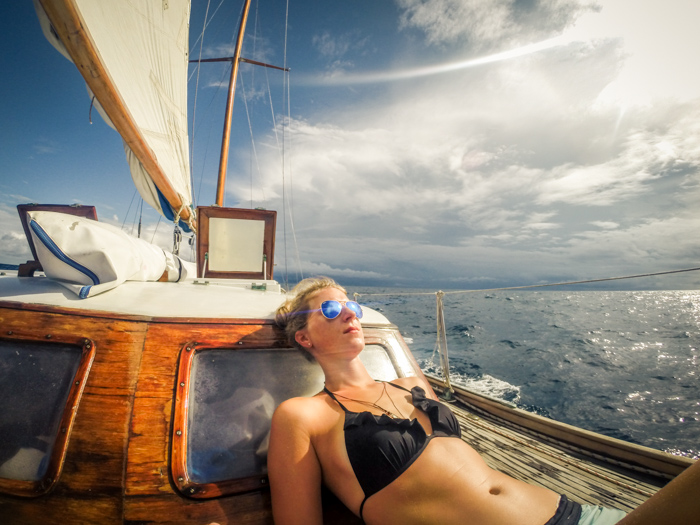
Leaving the bad weather behind

Danny is helping out with the steering and captain Paul is trying to sail. Christine is wondering what the fuck he is doing.

Sam, Christine and Danny

En lukt av bränd plast började ta form inne i salongen, och snart var hela kabinen full av rök. Det kom från motorn, och Paul begärde alla att ta sig ut för det var giftig luft där inne. Samtidigt stod Sindry och lagade mat precis intill. Paul fixade till motorn och vi tuffade vidare. Det dröjde inte länge innan det började ryka igen, och den här gången såg Paul lite mer bekymrad ut. Han sa att vi skulle ta en paus, låta motorn vila och vi kunde få hoppa i plurret. Vi hade fulla segel, men vid det här laget var det ingen vind överhuvudtaget och vattnet var så gott som platt. Vi hoppade såklart i, efter ett par dygn utan dusch behövde vi skölja av oss, även om det var saltvatten. Vi insåg dock att det var en ganska dum idé, för det var extremt motströmt och hade vinden ökat på hade vi legat kvar där i havet utan möjlighet att simma ikapp. Vi flöt bak mot gummijollen och räddade oss själva i den.
Solen gick precis ned, det var vackert och vännerna var ändå hyffsat nöjda, de kunde för första gången sedan de lämnat Colombia skymta land långt bort i fjärran. Den där lägerelden var bara fyra timmar bort. Vi festade till det med lite öl och dryckeslekar på däck, men det blev snart kolsvart och havet började få båten i röresle igen. Det kändes inte säkert att sitta på däck berusade, utan flytvästar på ett öppet hav med en kapten som antgaligen inte kunde hantera man över bord manövereringar, så vi tog oss in i båten istället. Paul blev dock inte glad eftersom vi då tände lamprona i båten, och han menade på att han inte kunde se vart han styrde.
Fyra timmar på sjön kan också innebära en jäkla massa fler timmar. Det gick inte så bra för Paul och den där motorn, så det var bara till att lita på seglet för att ta oss framåt. Lägereldsplanerna gick åt pipsvängen så vännerna gick till sängs för den tredje natten, somnandes till det kluckande ljudet mot skrovet och det lätt fladdrande seglet som inte kunde fånga vind.

English version
A smell of burnt rubbish began to take shape inside the saloon, and soon the whole cabin was filled with smoke. It came from the engine, and Paul ordered everyone to get out of the cabin because of poisonous air. At the same time Sindry was cooking food right next to it. Paul fixed the engine and we chugged on. It didn't take long before it started to smoke again, and this time Paul looked a little bit more worried. He said that we should take a break, let the engine rest and that we could jump into the water. We had full sail, but by now there was no wind at all and the water was almost flat. We jumped into the sea, after a few days without a shower, we needed to rinse us off, even though it was salt water. However, we realized it was a pretty stupid idea, because it was extremely countercurrent and if the wind would had picked up, we had remained there in the sea without being able to swim back. We floated back to dinghy and saved ourselves in it.
The sun just went down, it was beautiful and the friends were fairly satisfied, they could for the first time since they left Colombia glimpse land far away in the horizon. That bonpfire was only four hours away. We celebrated with some beers and drinking games up on deck, but it soon became pitch black and the sea began to get the boat in motion again. It did not feel safe to sit on the deck intoxicated, without life jackets on an open sea with a captain who probably could not handle a man overboard maneuver. We went back into the boat instead. Paul, however, was not happy because then we lit the lights inside the boat, and because of that he said he could not see where he was going.
Four hours on the ocean can also mean a hell lot of more hours. It didn't go very well for Paul and that engine, from then we just had to rely on the sails to get us moving. We had to put the bonfire plans into the bin, instead the friends went to bed for the third night. We fell asleep to the gurgling sound from the water against the hull and the flapping sail that could not catch any wind.
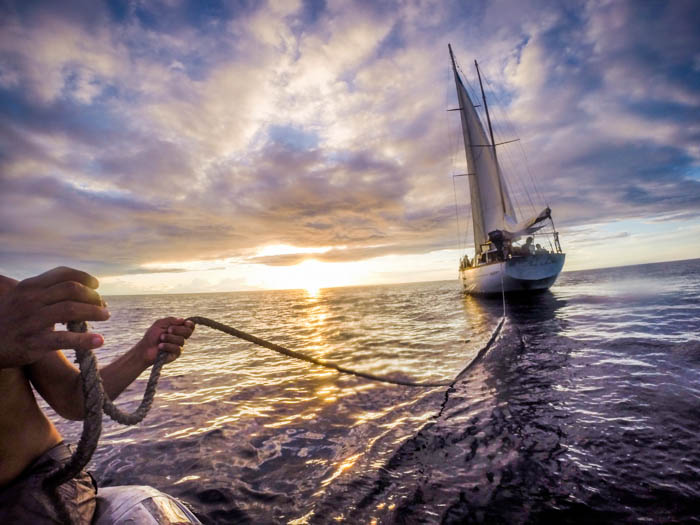
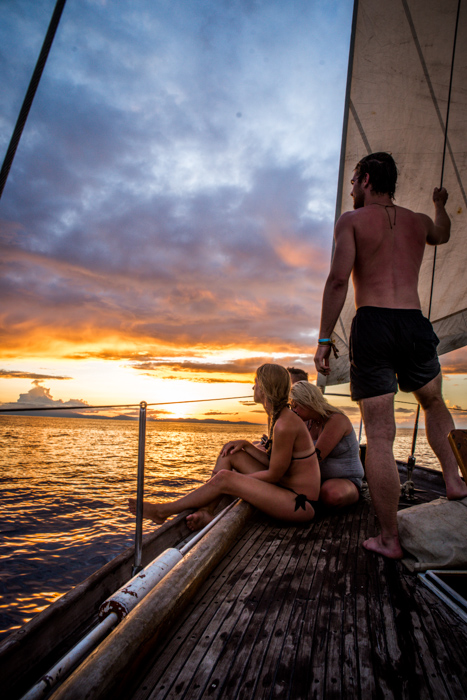
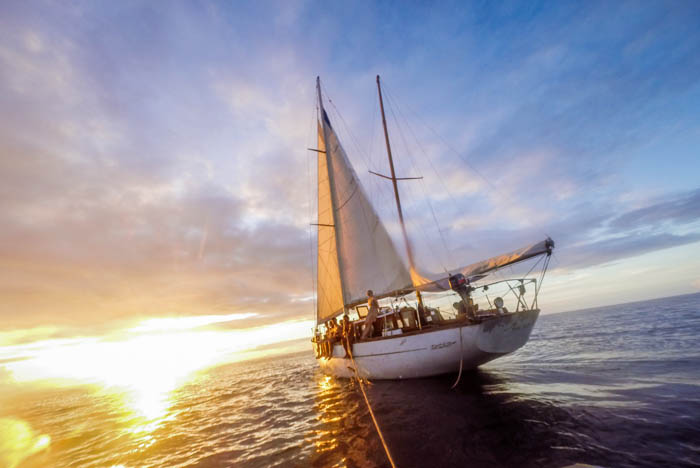
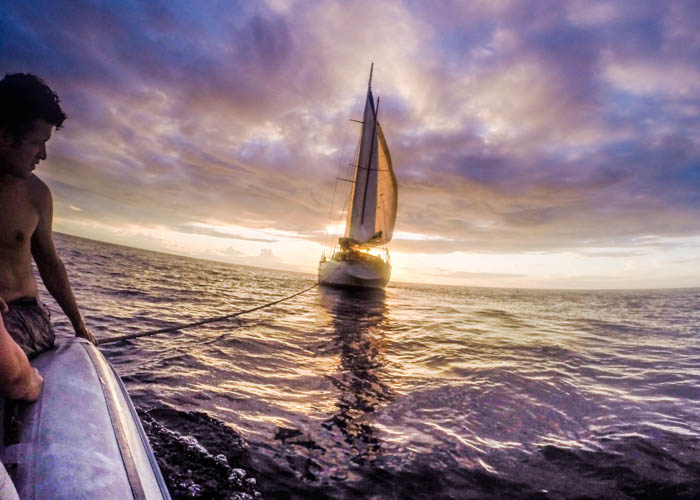
To be continued...
The San Blas "adventure"2014-12-24 15:51:00
"It's going to be the best trip of your lives. You will Visit the most beautiful beaches in the world."
Det var vad alla sa.
"Reset all your expectations."
Det var vad kaptenen sa.
De fem kommande dagarna skulle vi tillbringa på skutan Ave Maria som skulle ta oss från Colombia till tre "untouched islands" i San Blas utanför Panama. Vi var mer än taggade, vilket äventyr. De två första dygnen skulle vi spendera ute på det öppna havet, seglandes mot Panama. En seglats som vi var beredda på att den skulle ta allt från 30 till 40 timmar, ute på ett tufft hav med höga vågor. Vi var fullt medvetna om att denna översegling inte skulle vara speciellt trevlig, då alla vi pratat med mer eller mindre legat i en vrå och spytt under alla dessa timmar. Men trots detta menade dem att det var värt det, upplevelsen vid San Blas öarna skulle radera de sämre minnena från havet. Vi var väl förberedda med sjösjukepiller.
Men det blev inte riktigt som vi hade tänkt oss...
English version
"It's going to be the best trip of your lives. You will Visit the most beautiful beaches in the world."
That was what everyone told us.
"Reset all your expectations."
That was what the captain said.
The next five days we were going to spend on the ship Ave Maria that would take us from Cartagena in Colombia to three "untouched islands" in San Blas just outside of Panama. We were more than excited, what an adventure. The first two days we would spend on the open sea, sailing towards Panama. A sailing trip we knew could take anything from 30 to 40 hours, out on the rough seas with big waves. We were fully aware that the oversailing wouldn't be especially pleasant, everyone we talked to told us that they more or less had been laying in a corner, vomited during all those hours. But despite this they told us that it was going to be worth it, the experience at the San Blas islands would erase the bad memories from the sea. We were well prepared with seasickness pills.
But it didn't turned out as we had imagined it...
This is what we expected: (picture from google)
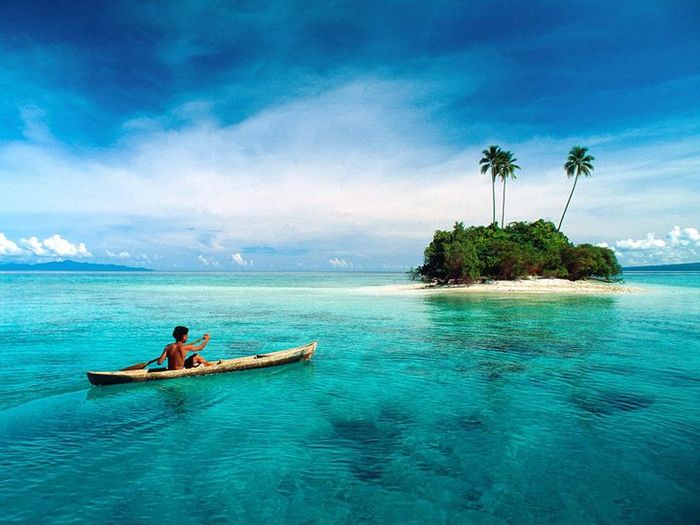
This is what we got. A beach coverd by tons of rubbish and vultures eating garbage.

- Först ut har vi Charlotte, en tatuerare från England. Med mottot "death is not the worst thing that can happen to man" var hon rädd för det mesta här i livet som skulle kunna bita henne. Till exempel; myror, fiskar, fjärilar... ja, till och med vågor.
- Sedan har vi Milton, en Brasilienare som rest runt överallt och bott i bland annat Australien. Kunnig i de flesta ämnen men hade framför allt oväntade kunskaper inom djur och natur. En ganska tokig man.
- Vårt enda par i gänget - Megan och Trevor från Kanada.
- Sam från Australien, gruppens tonåring (21) och spillevink. Han verkade för det mesta ha växtverk i fötterna då de oftast klättrade på väggar, i tak och i andra passagerares ansikten.
- Lilla Danny, Sam's högra hand, även han från Australien. Den optimistiska och alltid glada grabben i gänget.
- Och så var det vi, systrarna Sverige såklart, jag och Christine. Skärgårdsseglarna som skulle berätta för alla om segling, men som aldrig lyckades få vett i kaptenen.
Åtta obekanta samlade på en främmande segelbåt, vilandes i händerna på kaptenen Paul, 54, från Australien tillsammans med sin Colombiska själsfrände och kock Sindry, 32.
English version
All happy and excited, we met the rest of the passengers at the port before departure. Here's the six new friends;
- First up there is Charlotte, a tattoo artist from England. With the motto "Death is not the worst thing that can happen to man", she was afraid of most things in life that could bite her. For example; ants, fishes, butterflies... yes, even the waves.
- Then there is Milton, a Brasilian who has traveled around the world and lived in Australia amongst others. Knowledgeable in most subjects but had particularly unexpected knowledge of animals and nature. A pretty crazy man.
- Our only couple - Megan and Trevor from Canada.
- Sam from Australia, the teen of the group. He seemed to have growing pains in his feet as they usually climbed on walls, ceilings and other passengers' faces.
- Little Danny, Sam's right-hand, also from Australia. The optimistic and always very happy guy in the group.
- And so it was us, the Swedish sisters of course, me and Christine. Sailors who would tell everyone about sailing, but never managed to get some sense into the captain.
Eight strangers gathered in an unfamiliar sailing boat, resting in the hands of the captain Paul, 54, from Australia with his Colombian soul mate and cook Sindry; 32.
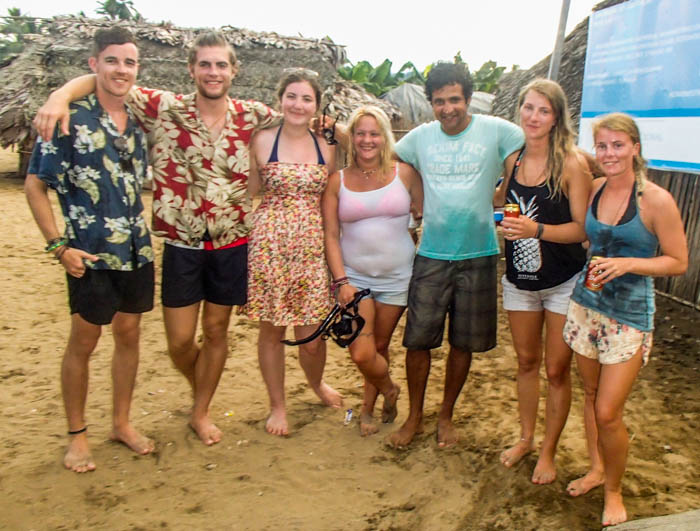

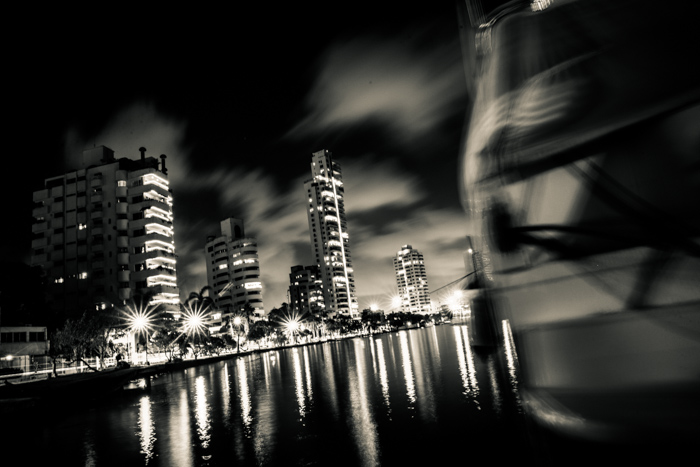
English version
It was time to leave. We jumped in a dinghy to go out to Ave Maria, well prepared with black garbage bags around our big backpacks to protect them from the tropical moisture where they would be kept throughout the journey. Our daily bags were thrown down at the bottom of the dinghy without protection, and it turned out that the dinghy was leaking water. It was a bunch of soaking wet bags that were carried on board that night. My camera equipment was bathing in the bag along with my laptop, I had to find a dry place to store them in order to avoid injury. However, it was impossible since every shelf, drawer and corner was cluttered by Paul's clothes.
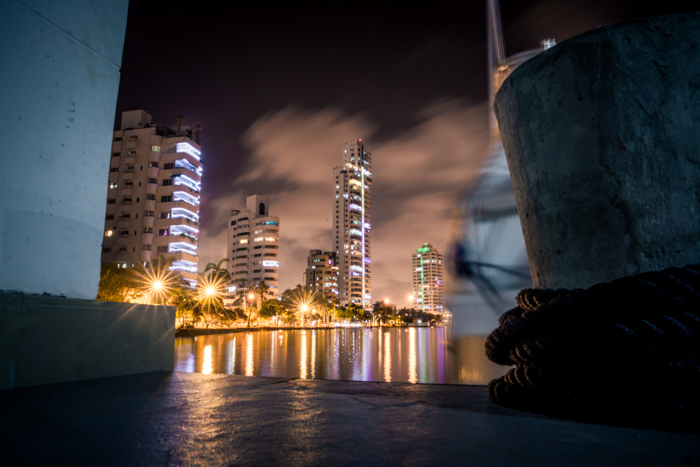
English version
On the way out we were stopped by the port police because we didn't have enough lanterns to sail overnight, but somehow Paul managed to get away with it and we went off. It did not take long until the sea began to take over the mood of the friends. It was already late at night, and Sam was the first out with a green face. He wanted to try to sleep his seasickness off so he went into our room in the forepeak. Bad idea, up front, it was like a roller coaster so after five minutes he came out again and fed the sea. Then it continued, one by one ...
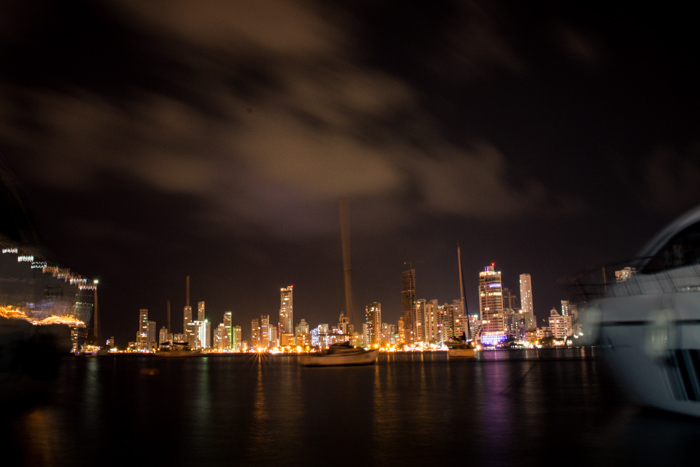

Danny, Sam, Megan, Charlotte, Milton, Christine and I

Det var dags att ge sig av. Vi hoppade i en gummijolle för att ta oss ut till Ave Maria, väl förberedda med svarta sopsäckar runt våra stora backpacks för att skydda dem mot den tropiska fukten där de skulle hållas förvarade under hela resan. Våra dagsväskor däremot slängdes ned underst i jollen utan skydd, och det visade sig att jollen läckte in vatten så det var ett gäng plaskblöta väskor som bars ombord den kvällen. Min kamerautrustning låg och badade i väskan tillsammans med min laptop, det gällde att försöka hitta ett torrt ställe att förvara dem på för att undvika skador. Det var dock omöjligt då varenda hylla, låda och vrå var belamrad av Pauls kläder.
- This is my home, not a luxury hotel. Don’t put sand or saltwater in my boat, öppnade Paul skepparmötet med. Han fortsatte:
- Reset all your expectations, I’m not an entertainer. If you want to have a good experience, it’s up to you to make it happen. I need help steering during the nights, and this is only a job for guys, not girls.
Enogh said. Det var inget snack om säkerhet ombord, var vi hade flytvästarna eller hur man skulle agera på en båt. Det var ju trots allt ett gäng landkrabbor ombord som skulle hjälpa till att segla en båt över ett av världens tuffaste hav. Vi lyckades hitta flytvästarna själva ifall att de skulle behövas, och vi lokaliserade livbåten ombord. Sex passagerare kunde den ta, men vi var 10 ombord. Vi hade ju också gummijollen, som i och för sig läckte in vatten – så summa av kardemumma – fyra av oss skulle vara körda ifall något gick snett. Vårt företags slogan var ”The safest and most secure way to San Blas” så vi tänkte inte så mycket mer på det.

Leaving the harbour in Cartagena, Colombia
English version
- This is my home, not a luxury hotel. Do not put sand or saltwater into my boat, captain Paul opened the meeting. He continued:
- Reset all your expectations, I’m not an entertainer. If you want to have a good experience, it’s up to you to make it happen. I need help steering during the nights, and this is only a job for guys, not girls.
Enogh said. There was no talk about safety on board, where the life jackets were or how to act on a boat. It was after all a bunch of landlubbers on board that would help to sail a boat over one of the world's roughest seas. We managed to find the lifejackets on our own in case they were needed, and we localized the lifeboat on board. It could take six passengers, but we were 10 people on board. We also had the rubber dinghy, which in itself was leaking water and air - so the sum of this - four of us would be screwed in case something went wrong. The slogan of our company was "The Safest and most secure way to San Blas" so we did not think much more about it.

På väg ut blev vi stoppade av hamnpolisen för att vi hade för lite lanternor på för att segla över natten, men på något sätt lyckades Paul komma undan med det och vi fortsatte iväg. Det dröjde inte länge förrän havet började ta över de förväntansfulla vännernas humör. Det var redan sent på natten, så Sam som var först ut med grönt ansikte skulle försöka sova bort sjösjukan och begav sig in till vår hytt i förpiken. Dålig idé, där framme var det som en bergochdalbana så efter fem minuter kom han ut igen och gödde havet. Därefter fortsatte det, en efter en...
English version

To be continued....
Cartagena partyboat2014-12-21 06:09:00
Efter en slirig natt i Cartagena så mötte vi vår kära vän Jonathan som vi träffade i Medellin. Han hade dragit ihop en partybåt för nästa dag och den kunde vi ju inte missa. Jäklar vad nice det var, hängde med ett skönt gäng på en nice båt med drinkar i kokosnötter. Vi käkade lunch vid ett fort där jag och Chrisse blev attackerade av stickiga bollar från marken. De bara dök upp från ingenstans och gjorde så att våra fötter blödde. AJ. Hur som helst, grym dag!
// After a crazy night in Cartagena we met our friend Jonathan who we met in Medellin. He had organised a party boat for the next day and we could of course not miss out of that. What a nice day, hung out with a nice bunch of people on a great boat with drinks in coconuts. We ate lunch at a fort where Chrisse and I were attacked by prickly balls from the ground. They just appeared out of nowhere and made our feet bleeding. Aouch. Anyway, awesome day!
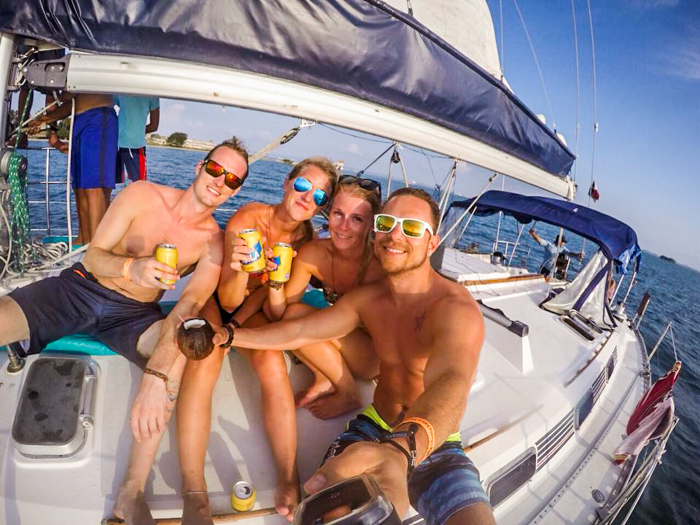
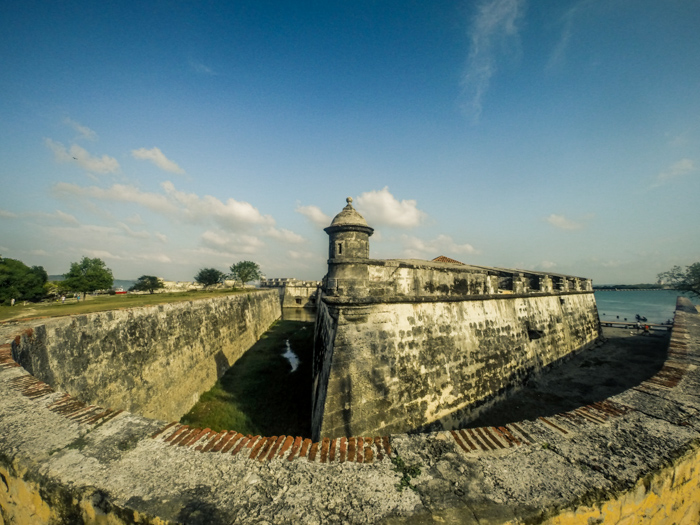


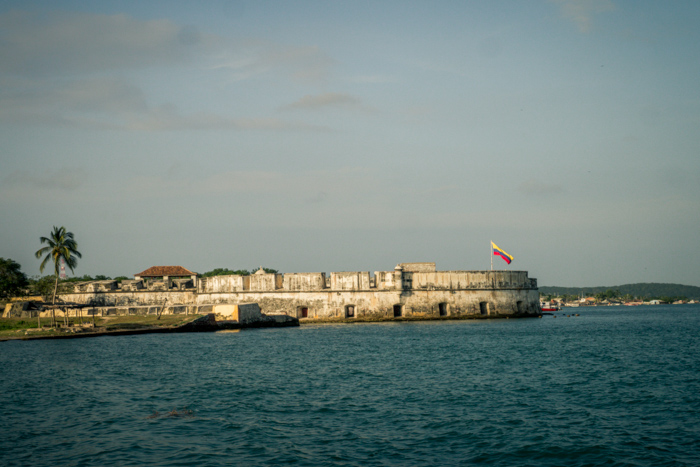

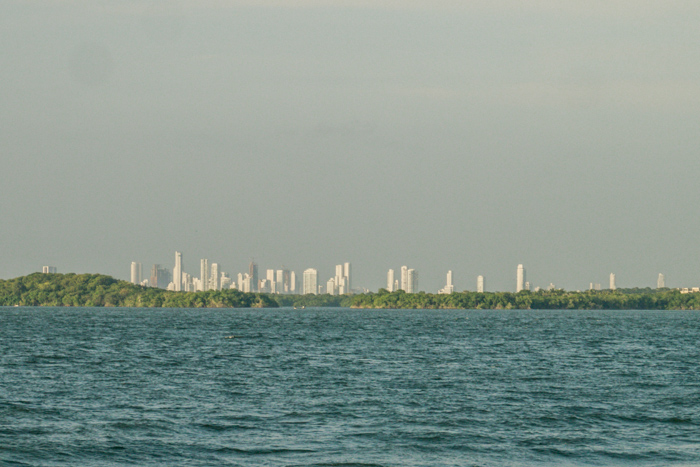

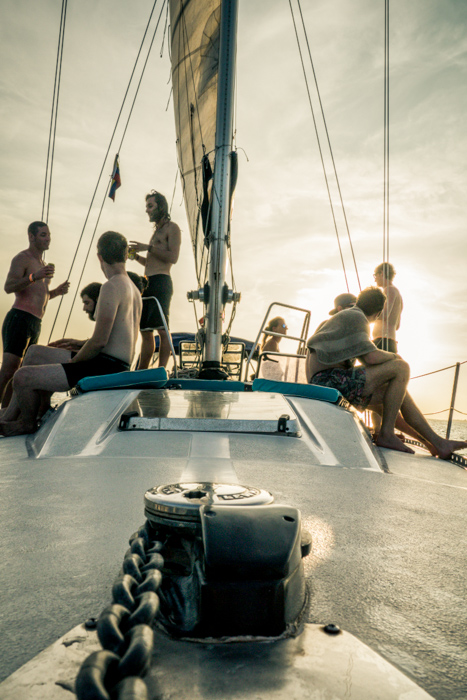

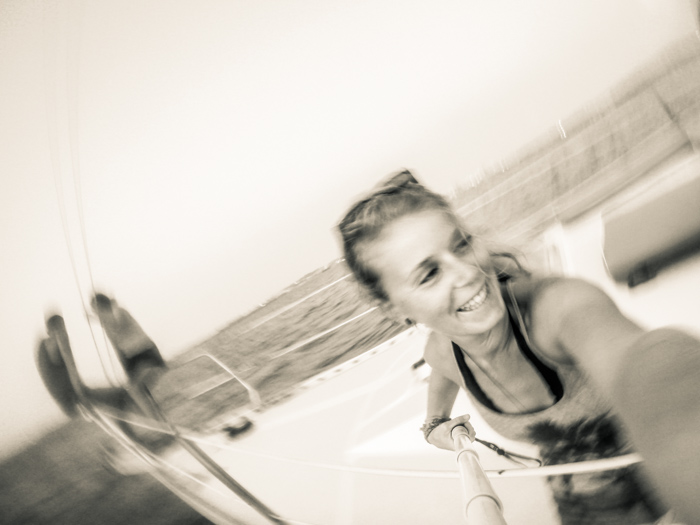


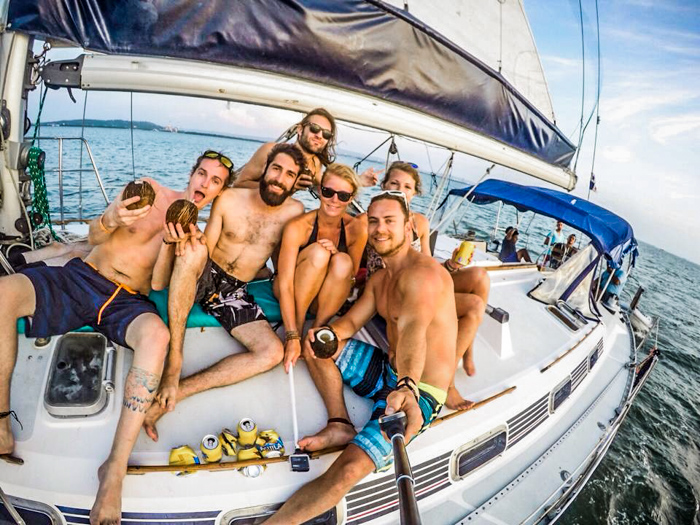

Minca2014-12-15 21:40:00
Efter nationalparken åkte vi upp en bit, till Minca på 650 möh. Riktigt mysig liten hippie-by i djungeln med en massa fina vattenfall runtomkring. Vi bodde på ett hostel som låg uppför en brant backe, efter att ha gått upp där med hela vår packning var man död. Hostelet ordnade "familjemiddagar" så vi åt allihopa tillsammans, väldigt mysigt. När vi gick till ett av vattenfallen följde Lola med oss, en hund som bodde på hostelet. Han bestämde sig för att hänga med oss hela vägen bort och tillbaka, han följde med oss på restaurang och han vakade över oss. Lustig hund, det var liksom bara vi två som gällde, alla andra runt omkring struntade han i.
// After the national park, we went up to Minca at 650 meters above sea level. A very cozy little hippie village in the jungle with a lot of nice waterfalls. We stayed at a hostel which was up a steep hill, after having walked up there with our big backpacks we were dead. The hostel had "family dinners" so we ate all together, very cozy. When we went to one of the waterfalls Lola followed came with us, the hosteldog. He decided to hang out with us all the way there and back, he came with us at the restaurant and he was watching over us. Funny dog.
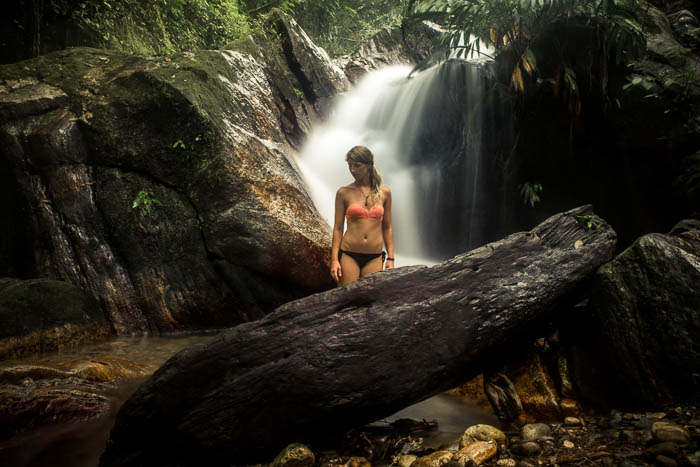







Lola
